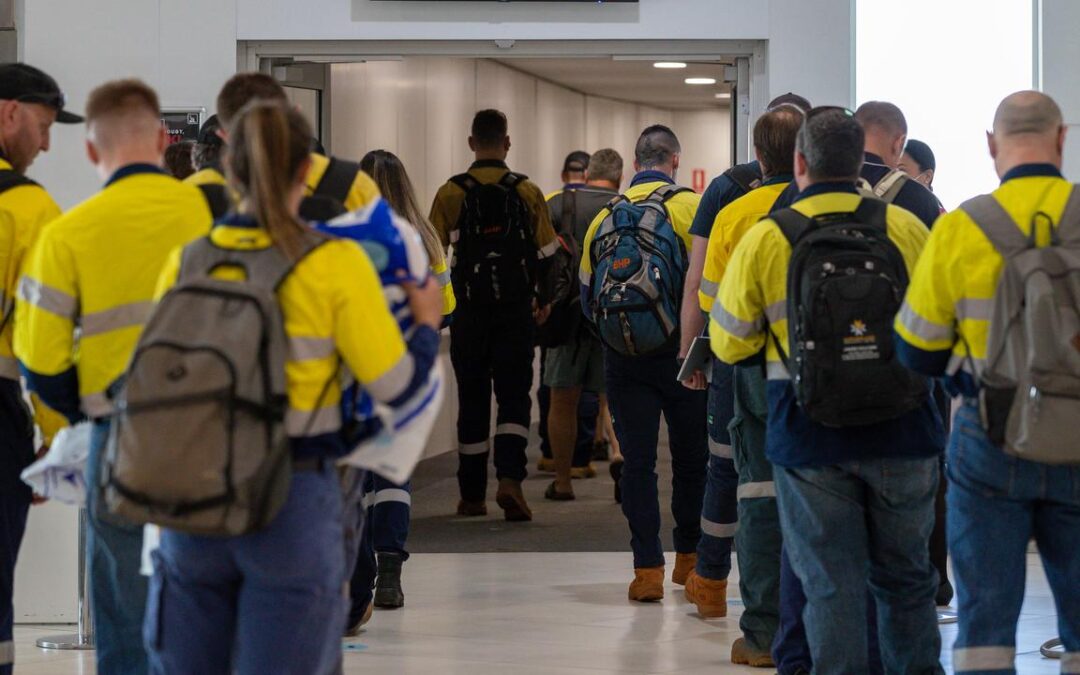
Fears FIFO work will turn gold towns into ghost towns
As mining executive Ron Heeks spruiks a major project to investors, he makes a pointed effort to highlight an attribute unrelated to the massive returns it will bring.
“Importantly, it’s not a FIFO (fly-in, fly-out) operation,” he tells the mining industry’s annual Diggers and Dealers gabfest in Kalgoorlie.
Mr Heeks, who spent 16 years working and living in the WA Goldfields hub, has been disheartened watching it be “destroyed by FIFO”.
He doesn’t want to see the NSW Northern Tablelands town of Armidale – 23km west of Hillgrove – suffer the same fate.
Larvotto Resources has fired the starter’s gun on the development of a $140 million antimony mine at Hillgrove, with production to begin next year.
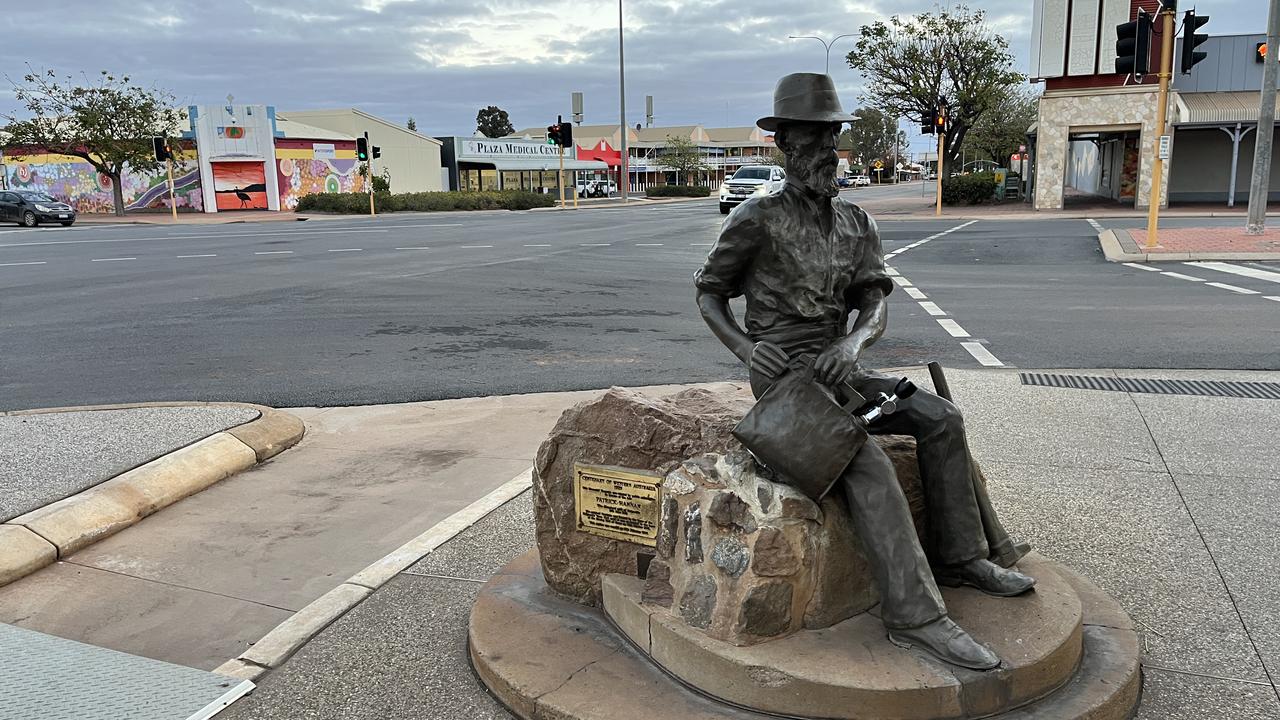
“You drive through Kalgoorlie now and, you know, the bottom half of Hannan Street, every second shop – or nearly all of them – are shut. It’s very, very sad,” the Larvotto managing director tells AAP.
“I think the industry as a whole does not do a particularly good job of putting back.”
Despite the huge boon miners have pocketed in recent years, with soaring gold prices delivering billions in windfall revenues, the permanent residents of Kalgoorlie feel little benefit has flowed their way.
The town’s resident population has declined by about a tenth over the past decade to just under 30,000, but housing is scarce, with much of it taken up to accommodate FIFO workers.
A recent application by goldminer Northern Star, which owns the mammoth open-cut mine that looms over the town, to build an 800-bed workers camp for staff working on a mill upgrade was met with concerted local opposition.

The project was approved by council in a three-two vote, despite 144 out of 148 submissions by members of the public opposed to the application.
The vast majority were concerned FIFO accommodation resulted in a lack of connection and contribution to the local community. The workers would not support local businesses, they feared.
“Get people to come and live here instead of FIFO. Get the population up, instead of down, otherwise Kalgoorlie will be a ghost town. Is that what we really want?” one submission asked.
The assessing officer noted Northern Star had proposed operating a daily shuttle bus transporting workers to and from the local shops to improve social and economic connections to the town.
“Our priority is always around residential workforce,” Northern Star chief executive Stuart Tonkin told reporters during a visit to the Kalgoorlie Super Pit site.
But the reality was the resident workforce could not support construction and other short-term jobs on its own, he said.
“We are filling up local facilities and hotels and utilising local places, as well as those temporary camps.”
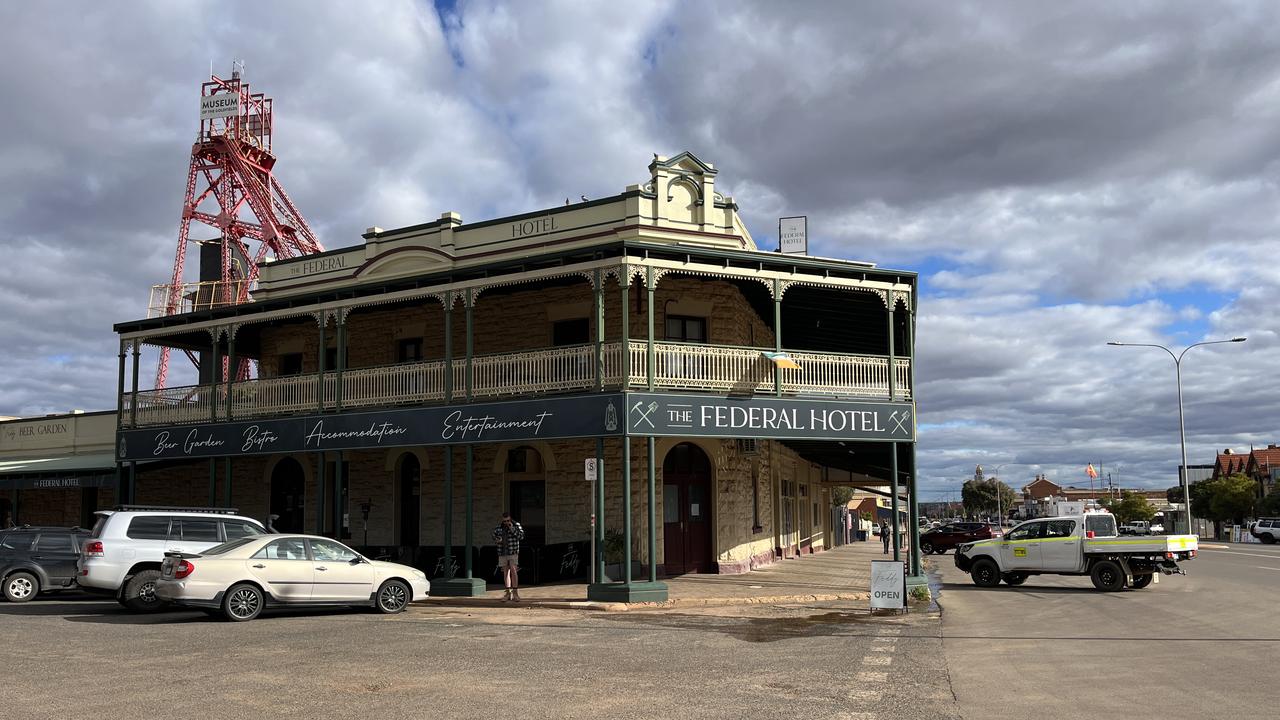
Local businessman Murray Leahy fought tooth and nail to avoid using FIFO workers for his Kalgoorlie-based mining services company MLG OZ.
But as the business took off, he hit a crossroads: bring in employees from out of town or stop growing.
“We started putting people in houses, and we established a structure whereby we’d fly you in and out for six months and if you wanted to transition your family in, we would pay for you and your family to move to Kalgoorlie,” he said.
“We would provide a house for you free of charge for six months and after that you could salary sacrifice it, so we were transitioning people from being flyers into being residents.
“Then we ran out of houses to do that with and the market became so strained that we had to stop that program.”
Mr Leahy said ideally all the company’s 450-odd workforce would be full-time residents, but he was still relying on 200 or so FIFO workers.
There was a desire among workers to join the community.
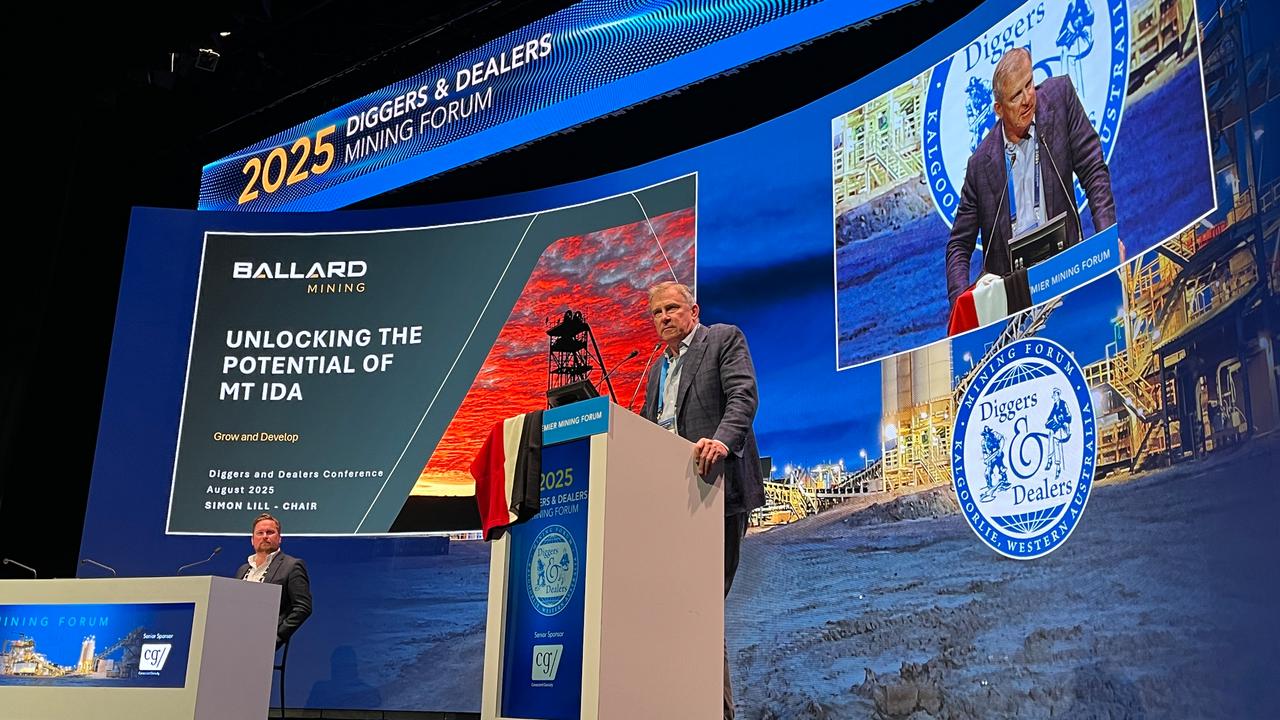
About 14 of MLG’s FIFO employees were looking to move their families to live in Kalgoorlie residentially but simply could not find a house, he said.
“Fundamentally, the issue that the Goldfields community has stems purely from the fact that we have had very poor state and local government planning over a long period of time,” Mr Leahy said.
The state has been “immensely slow” in releasing land to alleviate the situation, while provision of water and power to enable development has also been lagging.
The current council was working hard to try and rectify the issues, “but they are dealing with a 15-year legacy here of poor planning and poor management”.
“To effectively make the change that’s needed, it’s 100 per cent reliant upon our state releasing land and key services to be able to drive development.”
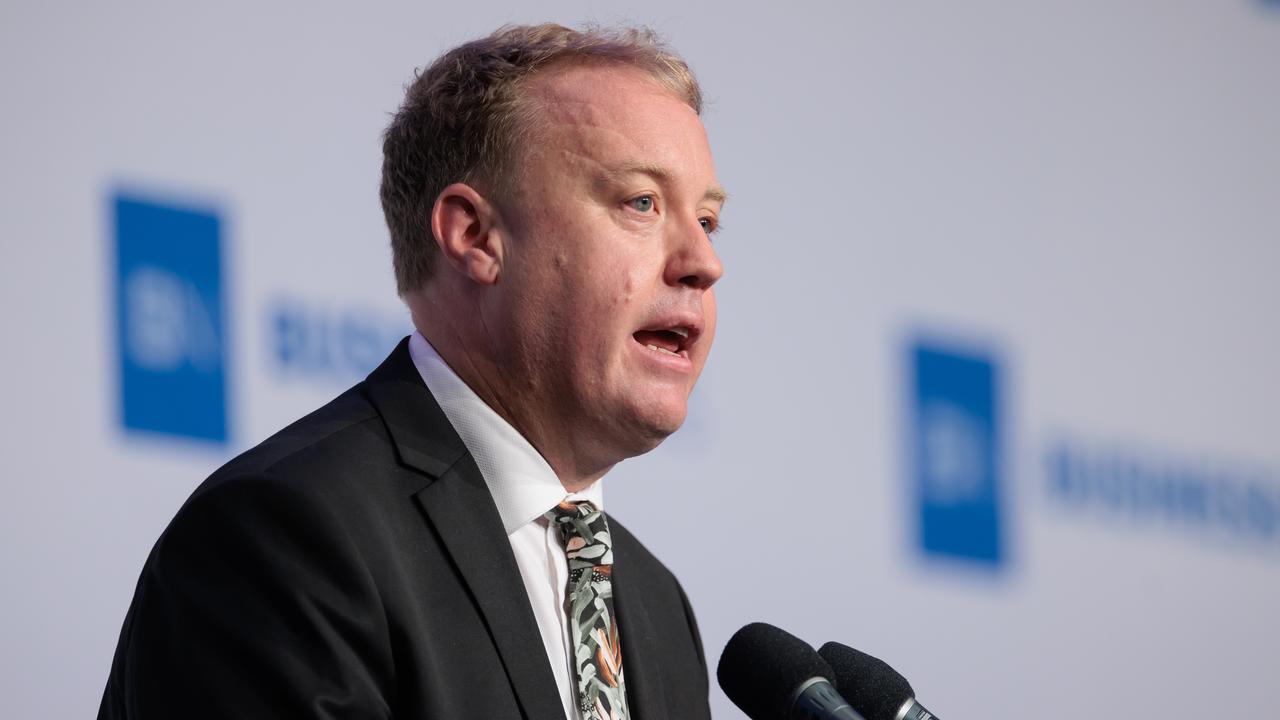
The government was investing significantly in the Goldfields region, said WA Mining Minister David Michael.
The WA budget included $16.8 million in funding to boost development-ready land in Kalgoorlie.
Planning was also underway to redevelop Kalgoorlie Health Campus, the state developer was selling houses at its Karlkurla estate project for as low as $205,000 and a new $150 million vanadium flow battery was being installed to secure Kalgoorlie’s energy supply,
“Government agencies are also working together, and with industry, to ensure there is sufficient land for housing across our state,” Mr Michael said.
“Land and housing development in the regions is constrained by contractor availability, infrastructure capacity and upgrade timing constraints, native title and higher development costs.”
Ballard Mining chairman Simon Lill said he would like to see the government provide more tax incentives for living in Kalgoorlie long term.
“I would love to, and I think Northern Star would love to, see more people in Kalgoorlie. And Lynus would love to see more people in Kalgoorlie. But in the current FIFO world, I’m not sure I can see that happening,” he said.
“Can they make life in Kalgoorlie tax-free for a period or no stamp duty on houses or something like that?
“It is sad to walk down the main street and see so many of the shops boarded up.”
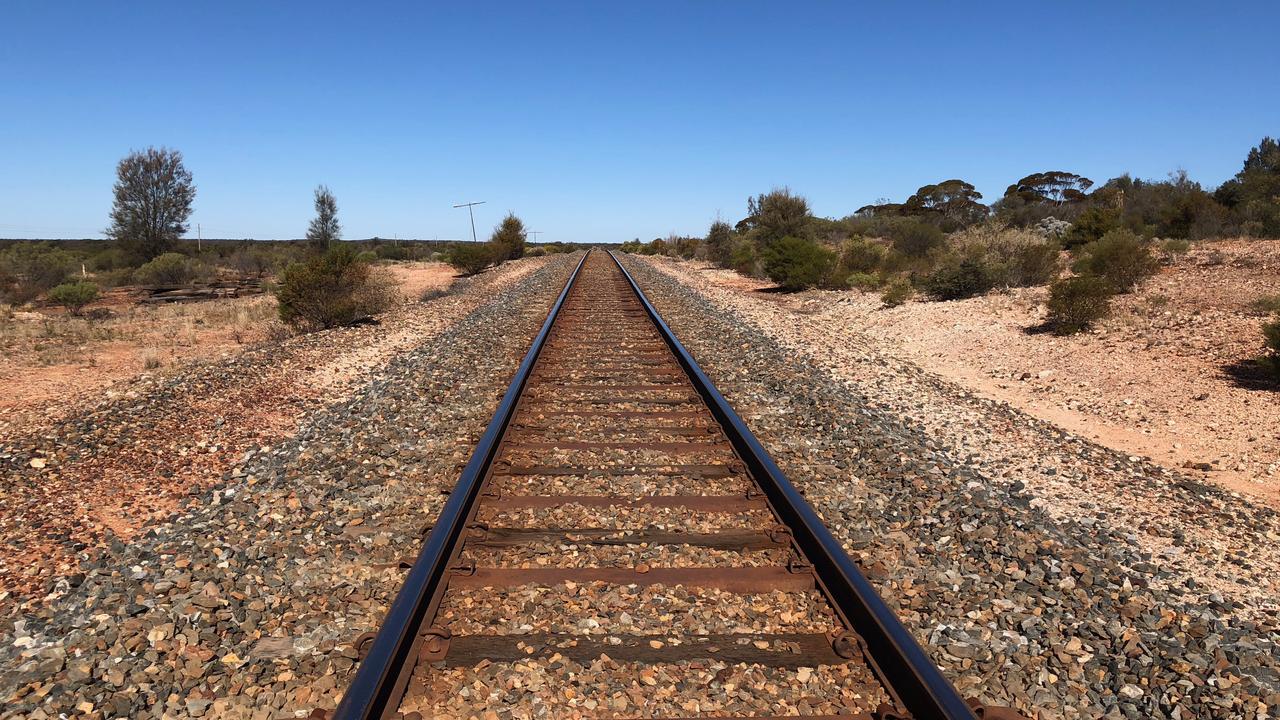
Mr Leahy also called for a more generous regional zone tax offset to incentivise people to live there permanently.
Kalgoorlie residents can currently claim $57 off their tax through the scheme.
Mr Michael said Kalgoorlie residents could already access generous stamp duty concessions, which the government expanded in the recent budget, and complemented other incentives like low-deposit loans for modular homes.
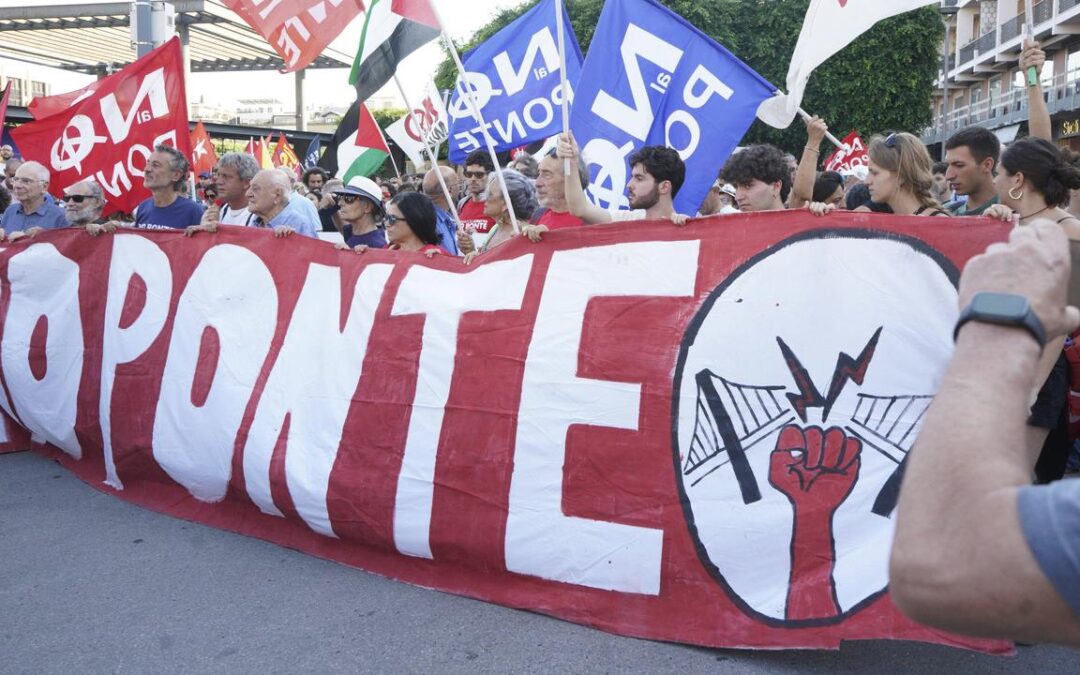
Thousands protest bridge linking Sicily to Italy
Thousands of people marched in the Sicilian city of Messina to protest a controversial government plan to build a bridge to connect the Italian mainland with Sicily.
Protesters staunchly oppose the 13.5-billion-euro ($A23.8 billion) infrastructure project over its scale, earthquake threats, environmental impact and the spectre of mafia interference.
The idea to build a bridge to connect Sicily to the rest of Italy has been debated on and off for decades, but has always faced delays.
The project, however, took a major step forward when a government committee overseeing strategic public investments approved the plan this week.
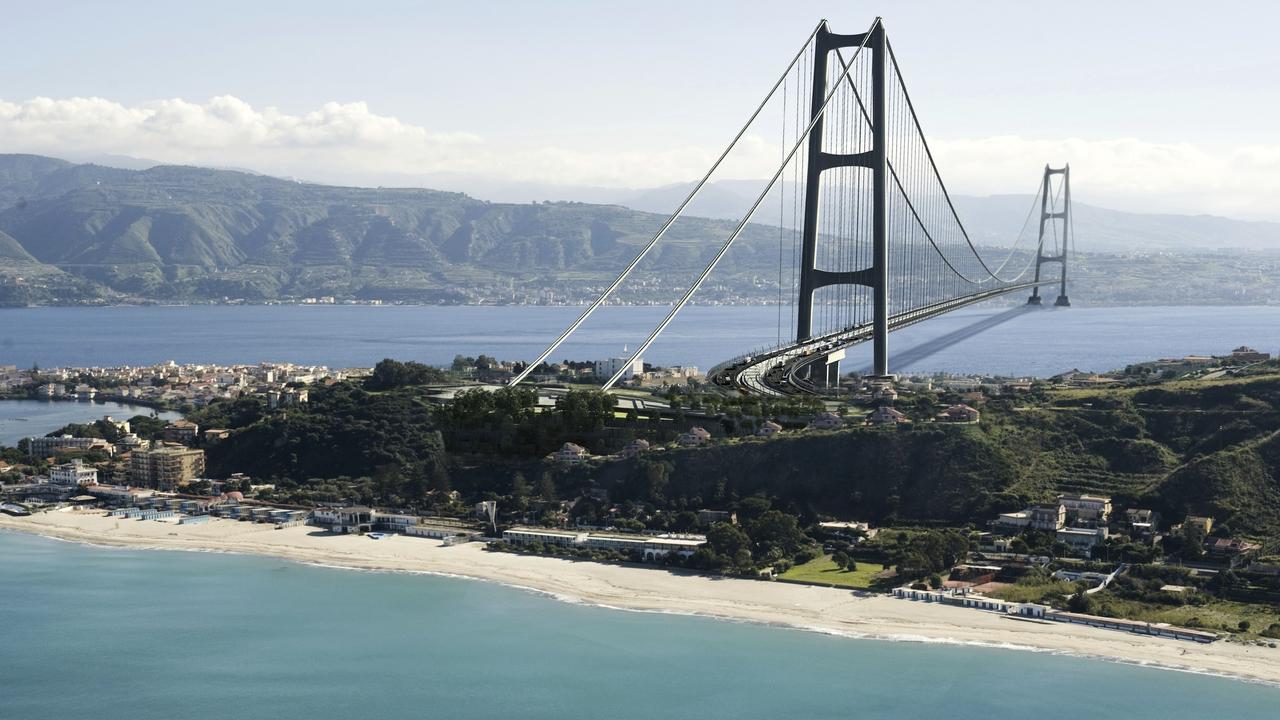
Transport Minister Matteo Salvini, the project’s main political backer, called it “the biggest infrastructure project in the West”.
Salvini cited studies estimating the project would create up to 120,000 jobs annually and help stimulate economic growth in economically lagging southern Italy, as billions more are invested in surrounding roads and infrastructure improvements.
Opponents are not convinced by these arguments.
They are also angry that about 500 families would have to be expropriated for the bridge to be built.
“The Strait of Messina can’t be touched,” protesters shouted as they marched in Messina.
Many carried banners that said “No Ponte” (No Bridge).
Organisers estimated the crowd size at 10,000 people.
The proposed bridge would span nearly 3.7 kilometres with a suspended section of 3.3 kilometres.
It would surpass Turkey’s Canakkale Bridge by 1.2 kilometres to become the longest suspension bridge in the world.
Preliminary work could begin as early as late September or early October, pending approval from Italy’s Court of Audit.
Full construction is scheduled to begin in 2026, with completion targeted between 2032 and 2033.
Plans for a bridge have been approved and cancelled multiple times since the Italian government first solicited proposals for one in 1969.
Premier Giorgia Meloni’s administration revived the project in 2023.
With three car lanes in each direction flanked by a double-track railway, the bridge would have the capacity to carry 6000 cars an hour and 200 trains a day, reducing the time to cross the strait by ferry from up to 100 minutes to 10 minutes by car.
The project could also support Italy’s commitment to raise defence spending to five per cent of gross domestic product targeted by NATO, as the government has indicated it would classify the bridge as defence-related.
Italy argues that the bridge would form a strategic corridor for rapid troop movements and equipment deployment, qualifying it as “security-enhancing infrastructure”.
Environmental groups, however, have lodged complaints with the European Union, citing concerns that the project would impact migratory birds.
Italy’s president has also insisted that the project remain subject to anti-mafia legislation that applies to all large-scale infrastructure projects.
Salvini pledged that keeping organised crime out of the project was a top priority.
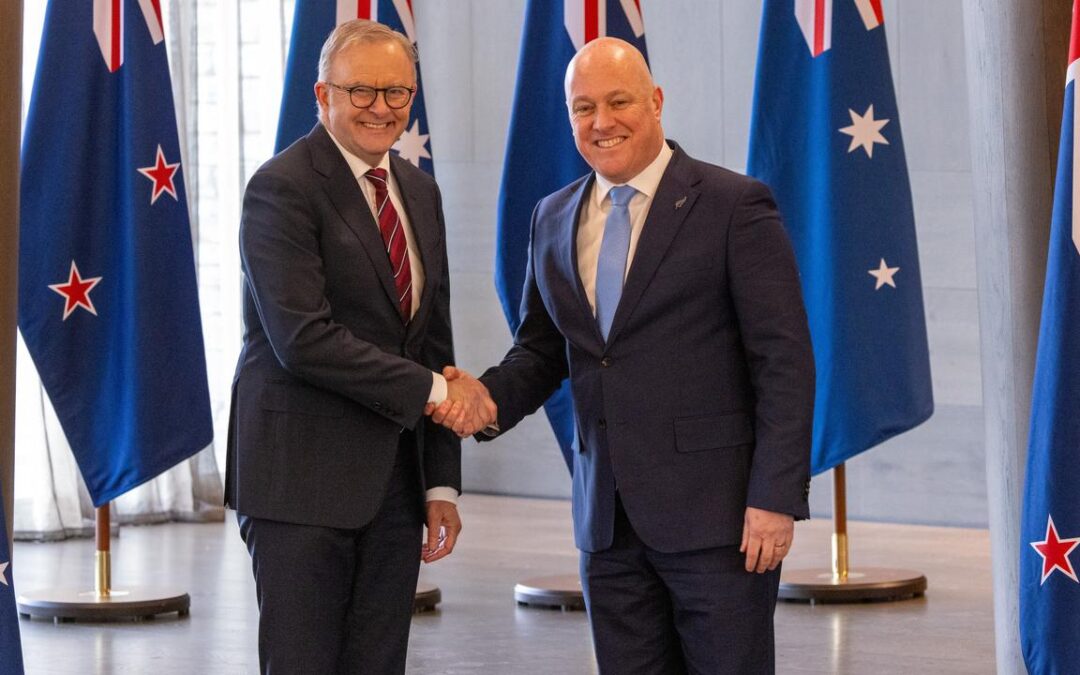
New era of trans-Tasman co-operation in turbulent world
Australia and New Zealand are entering a new era of co-operation as leaders from both nations embrace shared values in an increasingly turbulent world.
Prime Minister Anthony Albanese is in Queenstown for a two-day meeting with his New Zealand counterpart Christopher Luxon, marking his second time crossing the Tasman as leader after last visiting in 2023.
In a show of the bond between the two nations, Mr Luxon warmly embraced the Australian prime minister as they met on Saturday for leadership talks.
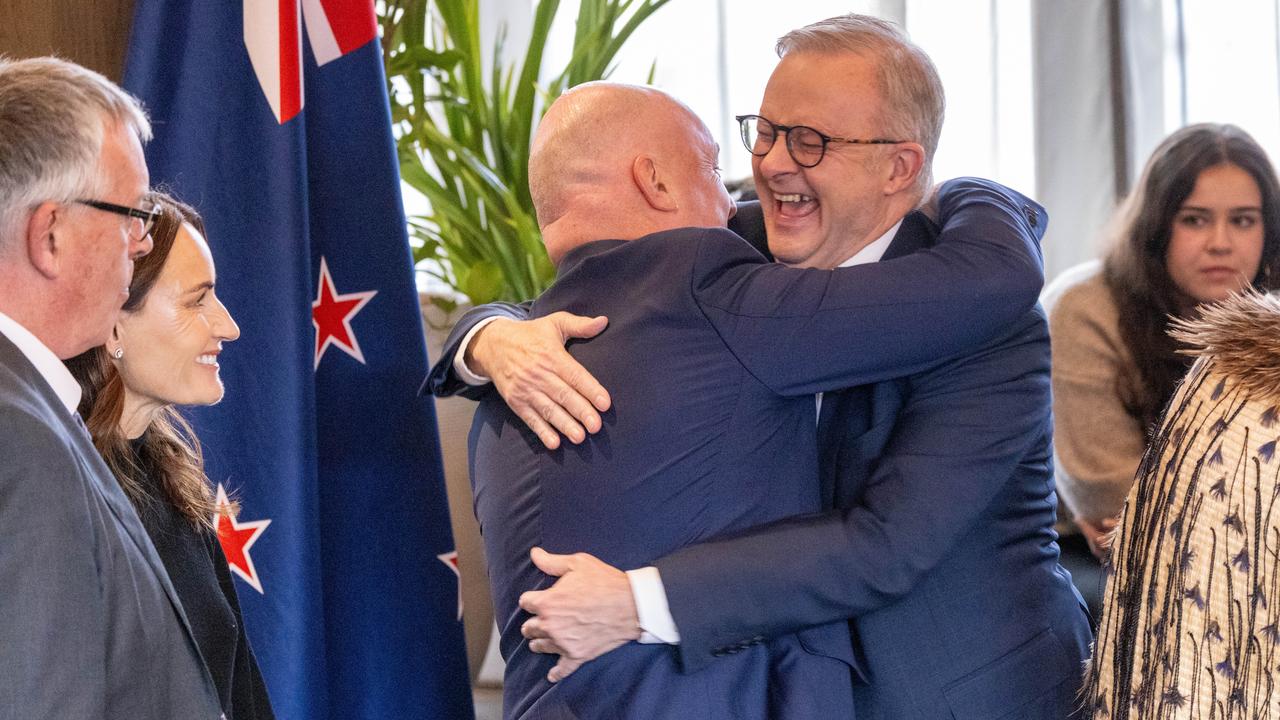
The first day centred on unity between the two nations and how they can co-operate on various issues, including safeguarding security and prosperity in an increasingly uncertain geo-strategic environment.
This included committing to further integrating the two nations’ economies in the “most unpredictable and dangerous” strategic environment in decades.
Foreign policy challenges relating to dealing with China, the United States and China’s encroachment in the South Pacific region would be agenda-topping issues during the talks, University of Otago politics researcher Nicholas Khoo said.
Both leaders agreed that competition between the world’s superpowers, China and the US, needed to be managed, and continued dialogue was important to reduce risks of misunderstanding, miscalculation, escalation and conflict in the Pacific region.
China was the main topic on everyone’s lips, with the pair discussing their grave concerns over its increasingly “dangerous and provocative” behaviour in the South China Sea.
Mr Luxon said the Asian superpower was a significant player in the world and a permanent feature of global affairs.
“We have an approach which is about co-operating where we can … We disagree where we must. We have different systems, different values,” he said, which Mr Albanese echoed.
Both leaders praised work to strengthen military co-operation, which Prof Khoo said was appropriate given the increasing uncertainty in international politics.
“It’s an area where we could legitimately expect to see very real progress,” he told AAP.
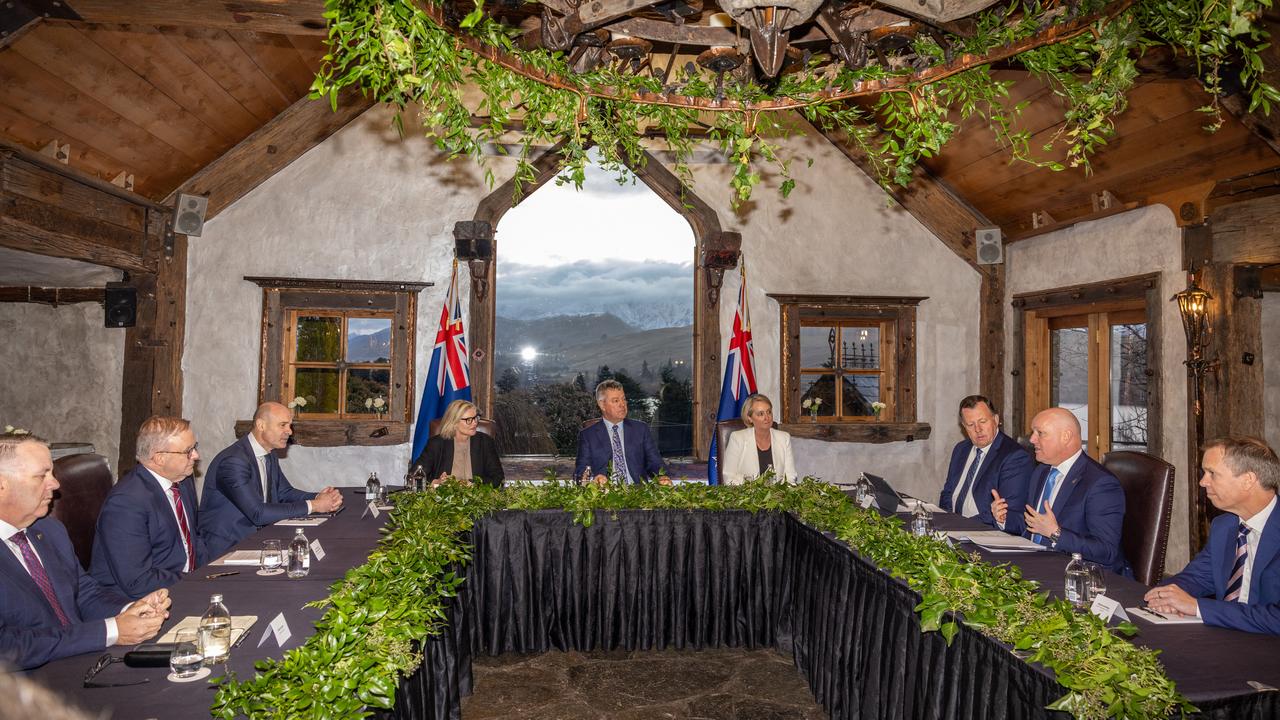
Prof Khoo said this meeting showed the two neighbours’ “steady build-up” of co-operation, which he said didn’t exist until two years ago.
‘”This is, in some aspects, a new era of co-operation, which is a positive development for both sides,” he said.
Prof Khoo said New Zealand only had one alliance partner in Australia, and this summit showed its investment in that relationship.
“In these very turbulent times, this is one of the linchpins of regional security that deserves the attention,” he said.
The Australian and New Zealand standards bodies have also announced a new agreement to renew joint standards arrangements, which will streamline regulations for certain sectors, including construction, healthcare and manufacturing, to boost economic growth.
In a sign of closer ties, Mr Albanese joked about going for a “cuddle” as both leaders sauntered off after the media conference arm-in-arm, laughing.
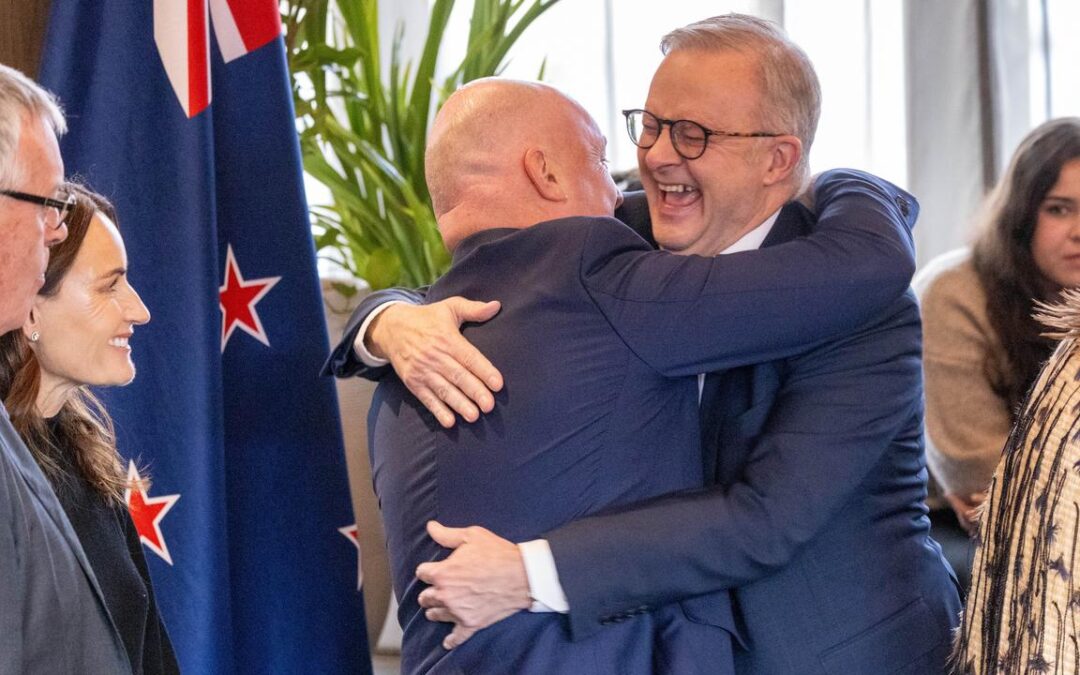
Australia and New Zealand embrace in ‘uncertain world’
Australia and New Zealand are promising to strengthen trade and security ties in an “increasingly fractious and uncertain” world.
Prime Minister Anthony Albanese has crossed the Tasman for annual talks with his Kiwi counterpart.
“In a time of global uncertainty, the certainty and the strength of this bond has never been more important,” Mr Albanese said in Queenstown on Saturday.
Greeting the Australian prime minister with an enthusiastic full-body hug, Christopher Luxon said his nation had “no greater friend than Australia”.
“You are family,” the New Zealand leader said.
“There’s nothing more certain than the bedrock of the relationship that we have between our two great countries.”
It is Mr Albanese’s second time across the Tasman as Australia’s leader and although he and Mr Luxon represent opposite ends of the political spectrum, both affirmed their nations “common outlook and deep trust”.
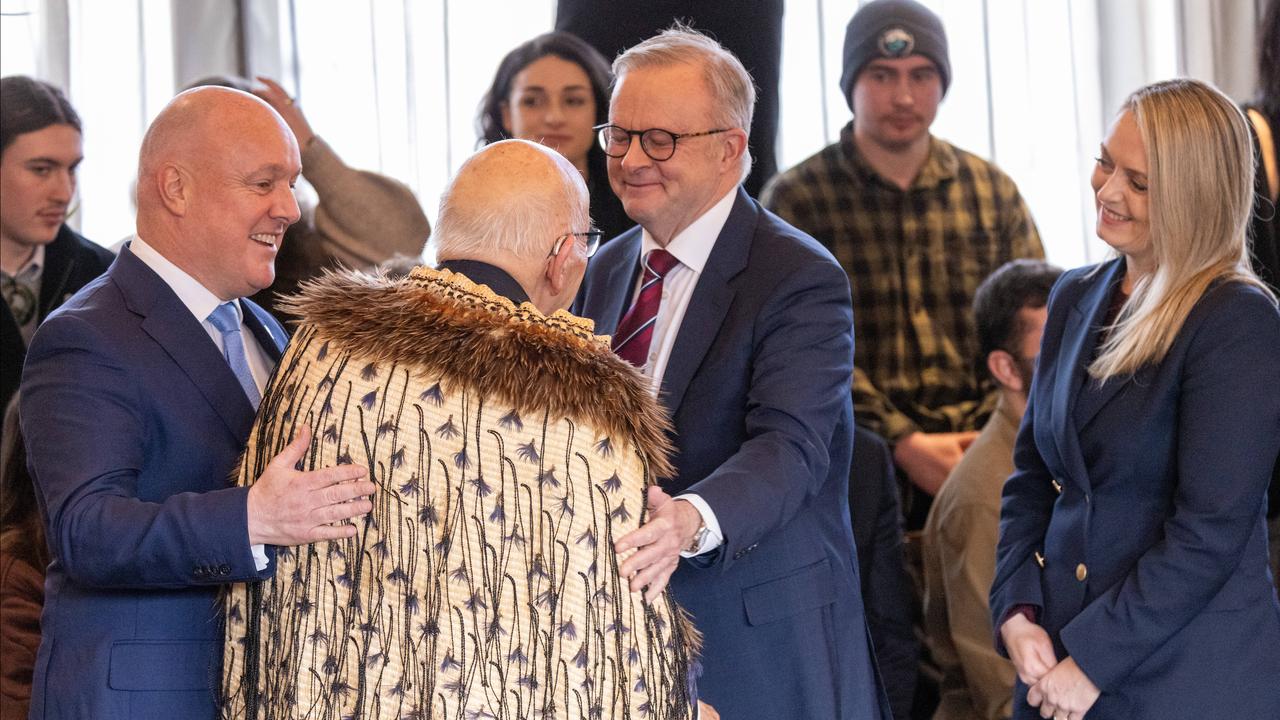
During an annual leaders’ meeting, the pair discussed defence, the war in Gaza and trade deals amid what they described as “the most unpredictable and dangerous strategic environment in decades”.
Mr Albanese addressed attendees by noting the “uncertain world” the two nations faced with “geopolitical tension, issues with trade and conflict in the world”.
“But there is one thing that is certain and that is that Australia and New Zealand stand together,” he said.
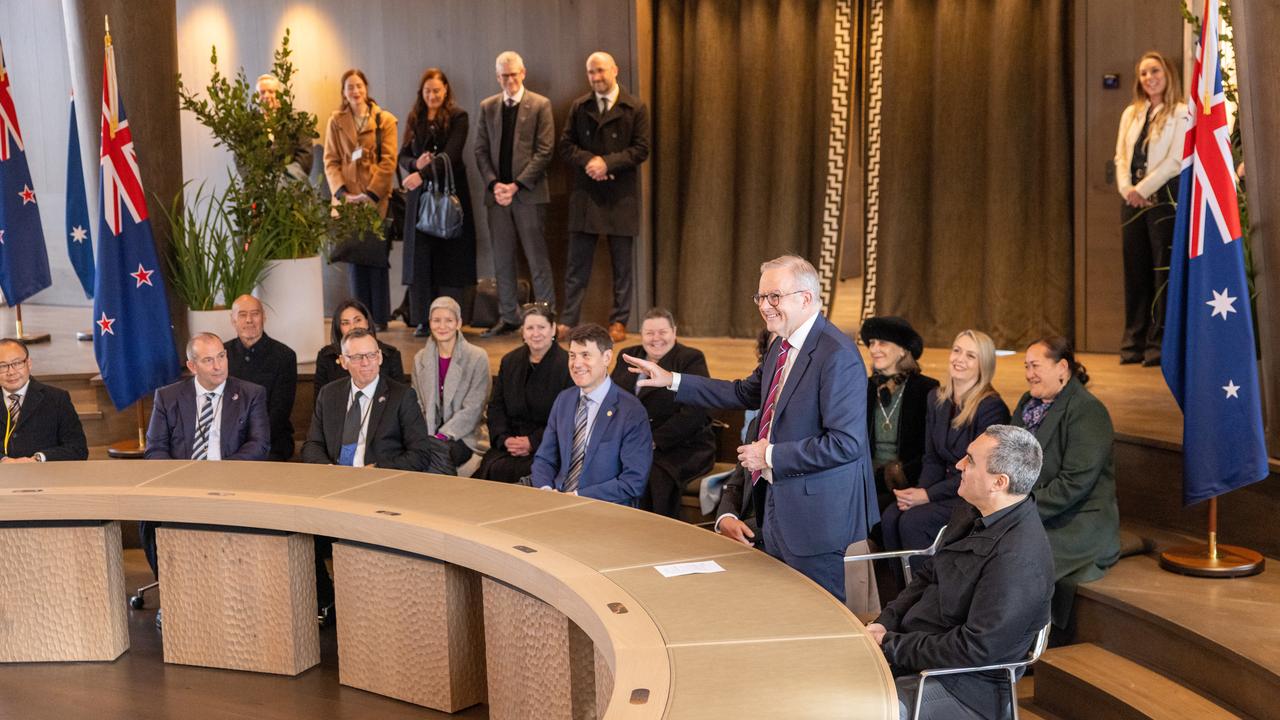
The leaders committed to further advancing the trans-Tasman single economic market, established in 2009 to grow trade and deepen investment links between the two countries, as “an example for the world”.
“At a time when free and fair trade is being questioned, I think it’s really important that we emphasise the opportunity that’s there as well for both of our nations being located as we are,” Mr Albanese said.
“Just to our north is the fastest-growing region in the world in human history, and that represents opportunity.”
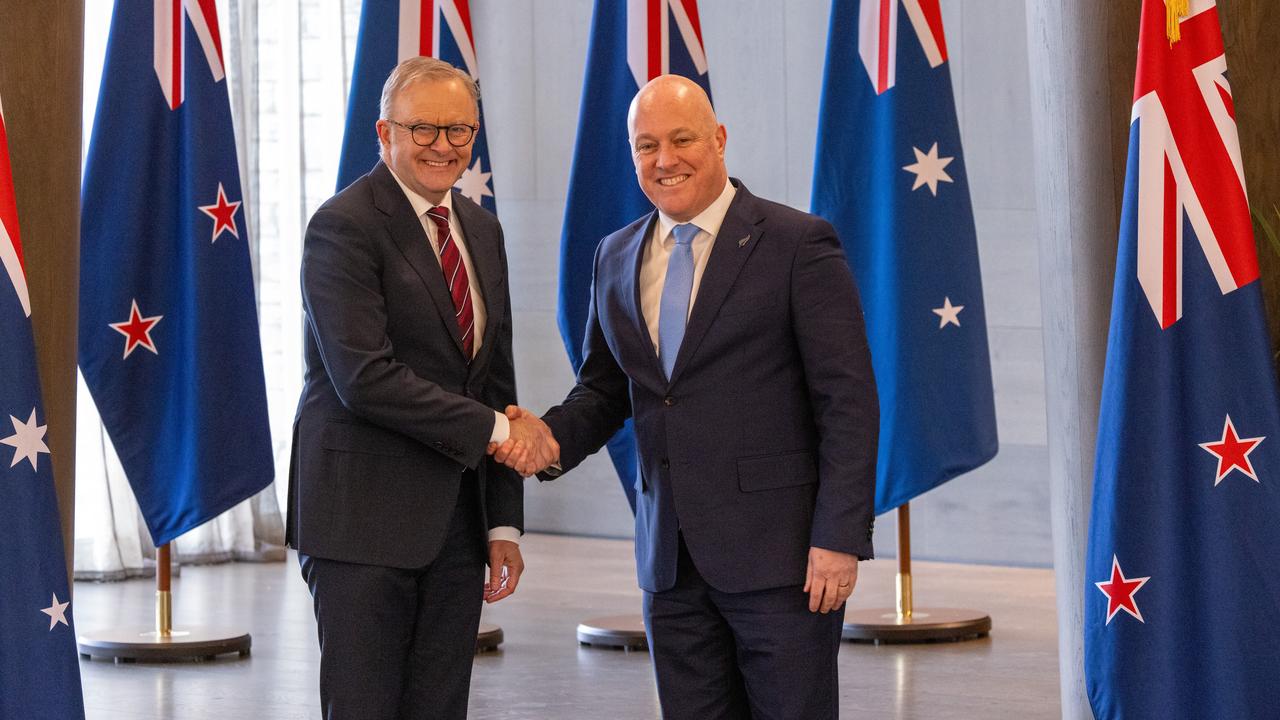
The “complicated” relationship between opportunities and challenges posed by China became a focus of talks behind the scenes
“China is a massive and significant player in the world, and it’s a permanent feature of global affairs,” Mr Albanese told reporters shortly after the closed door meetings.
“We have a approach which is about co-operating where we can (and) we disagree where we must.
“We have different systems, different values … We’ll stand up for those at different times, and we’ll have differences.”
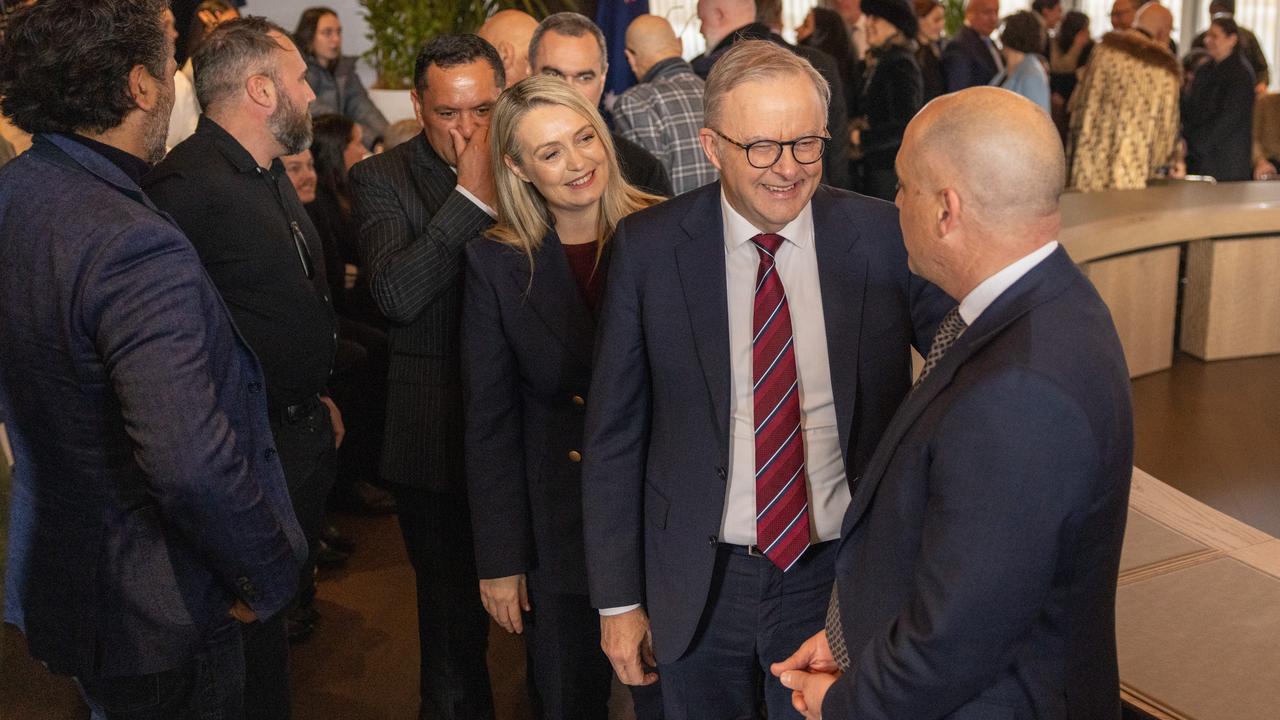
The pair also discussed the impact of the US President Donald Trump’s tariffs.
While Mr Trump raised tariffs against dozens of nations, he showed mercy on Australia and kept levies against most products at 10 per cent.
But New Zealand was not spared – hit with a 15 per cent “reciprocal” tariff.
Mr Albanese and Mr Luxon said they stood for “rules-based trade” where businesses could be given certainty and predictability.
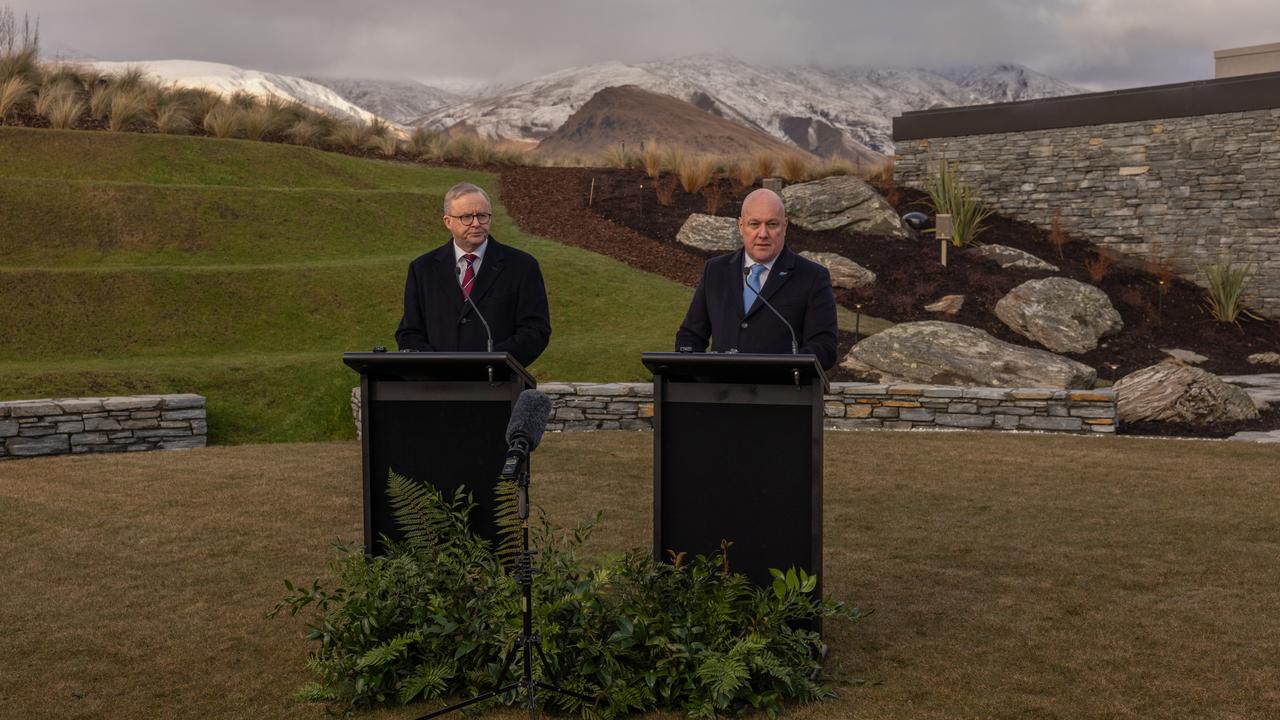
The leaders expressed their concern at the recent turbulence in global trade, vowing to co-operate to continue global trade and investment openness.
They also agreed to work together to reform the World Trade Organisation as the foundation and enforcer of global trade rules.
David Capie, from Victoria University of Wellington, said the Luxon government had leaned into its partnership with Australia since coming to power.
“You’ve got a New Zealand government that wants to do more with Australia,” the foreign and defence policy expert told AAP.
“The up-ending of the economic order with the Trump tariffs, the Middle East – all of those things NZ and Australia are finding that they’re very closely aligned.”
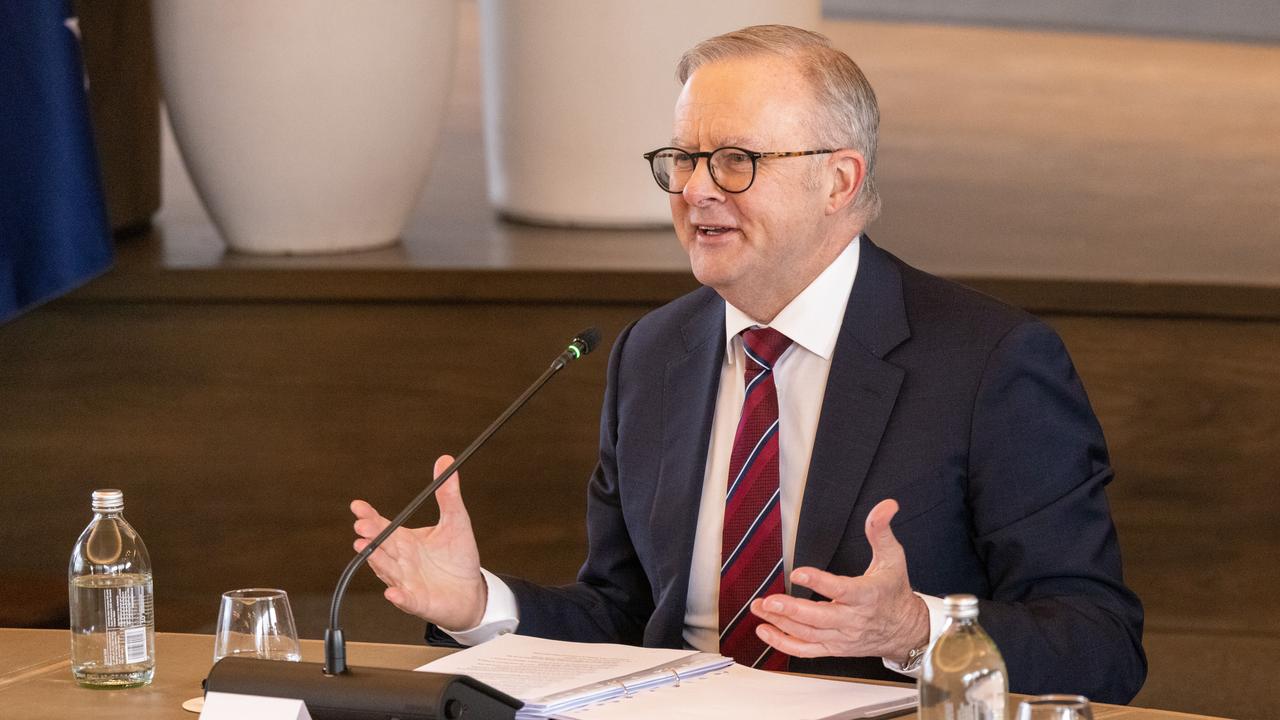
The meeting coincided with the release of a joint statement from the foreign ministers of Australia, New Zealand, Germany, Italy and the United Kingdom, condemning Israel’s plan to intensify the war on Gaza and assume full control of the territory.
In it, the ministers said they “strongly reject” Israel’s decision to launch a large-scale military operation in Gaza and warned the looming military operation risked violating international law and putting the lives of hostages and civilians in more danger.
Mr Albanese’s two-day trip to New Zealand continues on Sunday.
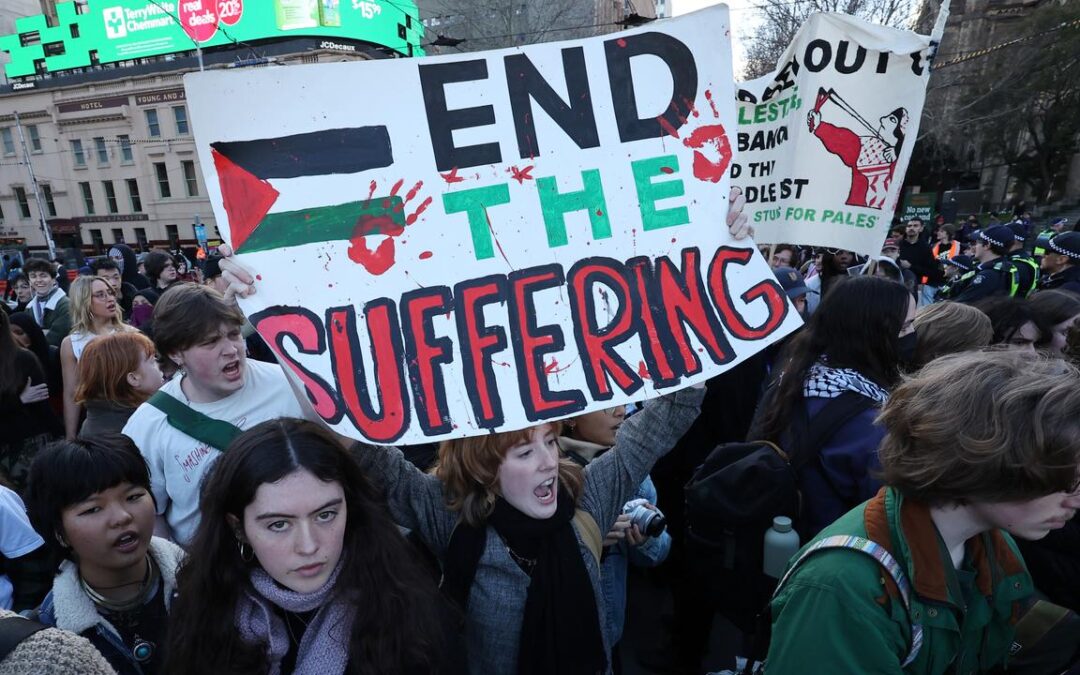
‘Human catastrophe’: PM condemns Israel’s plan for Gaza
Anthony Albanese is urging his Israeli counterpart to rethink a decision to re-invade and take control of Gaza City “before it is too late”.
The prime minister joined a chorus of global leaders condemning the plan and warning it would worsen a humanitarian crisis in the devastated enclave.
After a meeting in Queenstown on Saturday, Mr Albanese and New Zealand Prime Minister Christopher Luxon issued a joint statement calling on Israel to comply with international law.
“Any attempt by Israel to escalate hostilities, including by taking control of Gaza City, would be wrong, risk violating international law, and exacerbate the human catastrophe already unfolding inside the Gaza Strip,” they said.
“We urge the Israeli government to reconsider before it is too late.
“Any proposals for the permanent forced displacement of the Palestinian population must be abandoned.”
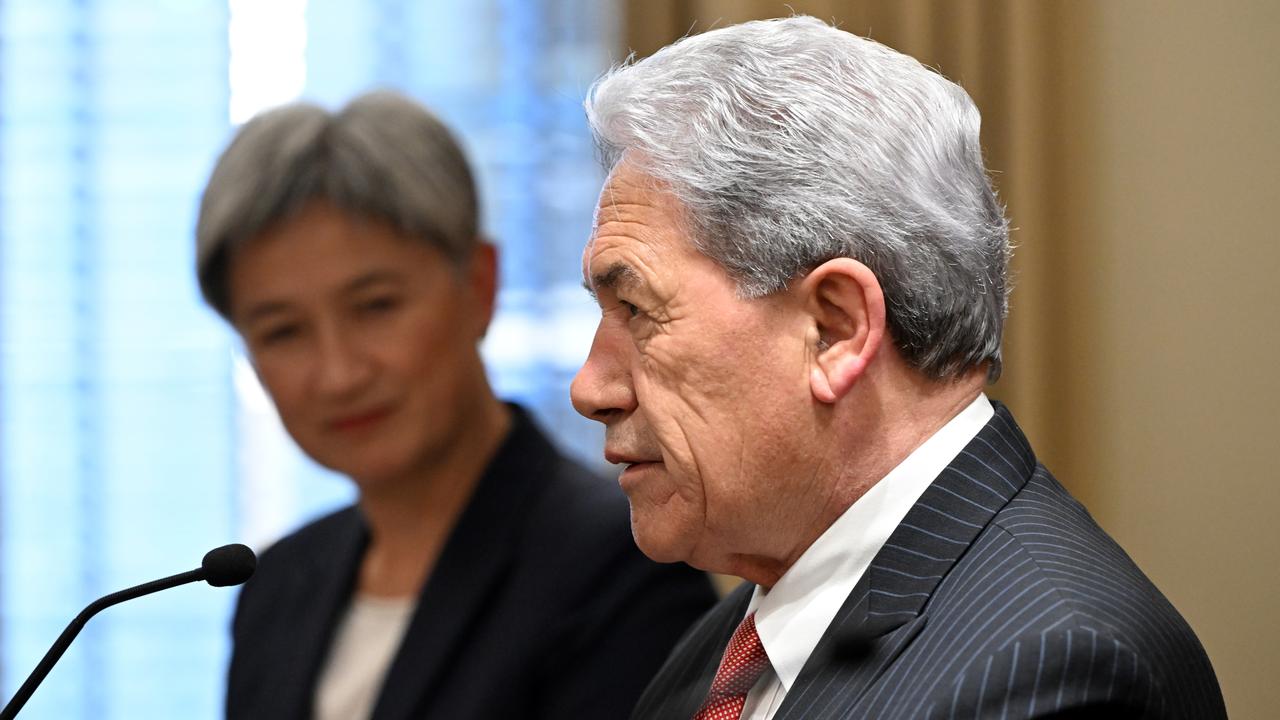
Foreign Minister Penny Wong separately warned the looming military operation risked putting the lives of hostages and civilians in more danger.
Senator Wong joined Germany, Italy, New Zealand and the United Kingdom to “strongly reject” Israel’s decision to launch a large-scale military operation in Gaza.
The foreign ministers said the plans would aggravate the catastrophic humanitarian situation, endanger the lives of the hostages and further risk the mass displacement of civilians.
“We urge the parties and the international community to make all efforts to finally bring this conflict to an end now, through an immediate and permanent ceasefire,” they said.

Israeli Prime Minister Benjamin Netanyahu went against the advice of his military leaders to declare he intended to take military control of all of Gaza.
“We intend to,” Mr Netanyahu told Fox News when asked if Israel would take over the entire territory.
Israel would eventually hand over the territory to Arab forces, which would govern it, he said.
“We don’t want to keep it,” Mr Netanyahu said.
“We want to have a security perimeter. We don’t want to govern it. We don’t want to be there as a governing body.”
The move could displace an estimated one million Palestinians and has sparked international outrage.

Germany has suspended arms sales to Israel, concerned the weapons could be used in Gaza and marking a major shift in its foreign policy.
German Chancellor Friedrich Merz, a conservative whose support for Israel was a foundation of his election campaign, said he would not authorise any exports of military equipment that could be used in Gaza “until further notice”.
The UN secretary general António Guterres described the plan as a “dangerous escalation” and European Commission president Ursula von der Leyen also urged Israel to reconsider.
Going a step further, Amnesty International’s secretary general Agnès Callamard described Israel’s latest actions as “utterly outrageous and revolting”.
Ms Callamard called on the international community to suspend arms transfers, adopt targeted sanctions and terminate engagement with Israeli entities rather than “professing empty platitudes and condemnations”.
“These would merely constitute another smokescreen, while allowing the horrors of Israel’s genocide to unfold,” she said.

The Israeli government is pursuing “total victory” in its war with Hamas, which attacked the nation’s south in October 2023, killing approximately 1200 people and taking about 250 hostages.
Israel’s retaliatory assaults have killed more than 61,000 Palestinians, according to the Gaza health ministry.
Some 200 people, almost half of them children, have reportedly died of starvation.
The worsening humanitarian situation has driven plans from the UK, France and Canada to call for the recognition of Palestine at a UN meeting in September, pending conditions such as Hamas returning the remaining hostages.
Australian government ministers have said the nation’s recognition of Palestinian statehood is a matter of “when, not if”.
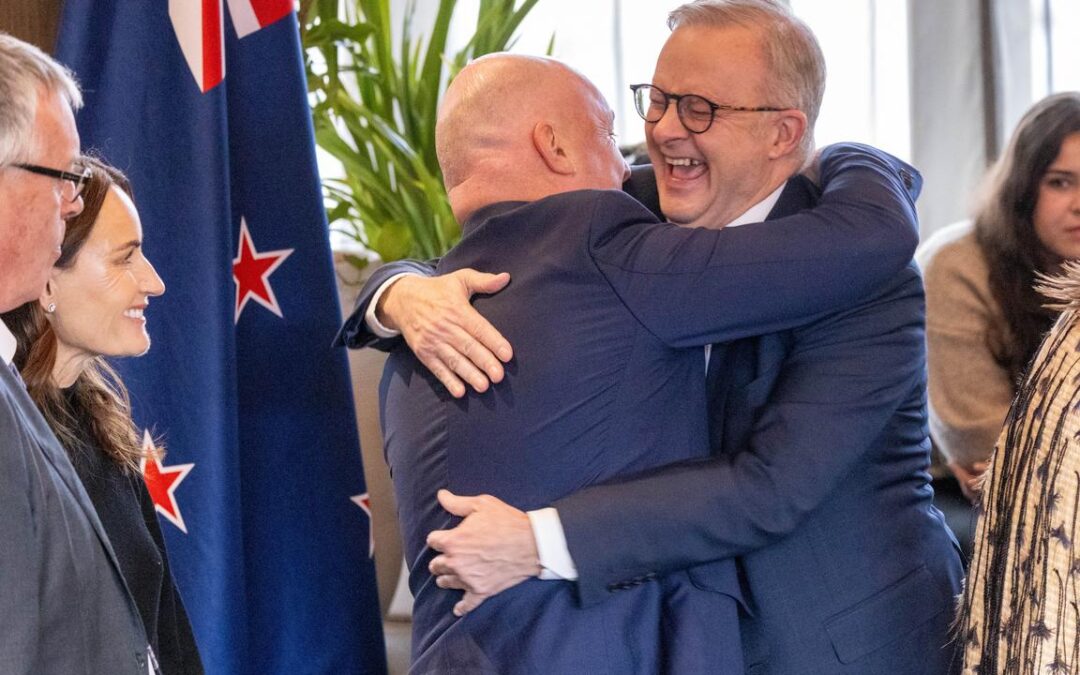
Albanese warmly embraced as he arrives in New Zealand
Anthony Albanese has been welcomed with an enthusiastic embrace by his New Zealand counterpart as the pair prepare to discuss defence, the war in Gaza and trade deals.
The prime minister, who arrived in Queenstown on Saturday for an annual Australia-New Zealand leaders meeting, wore a wide grin as he hugged Christopher Luxon.
It is his second time across the Tasman as Australia’s leader.
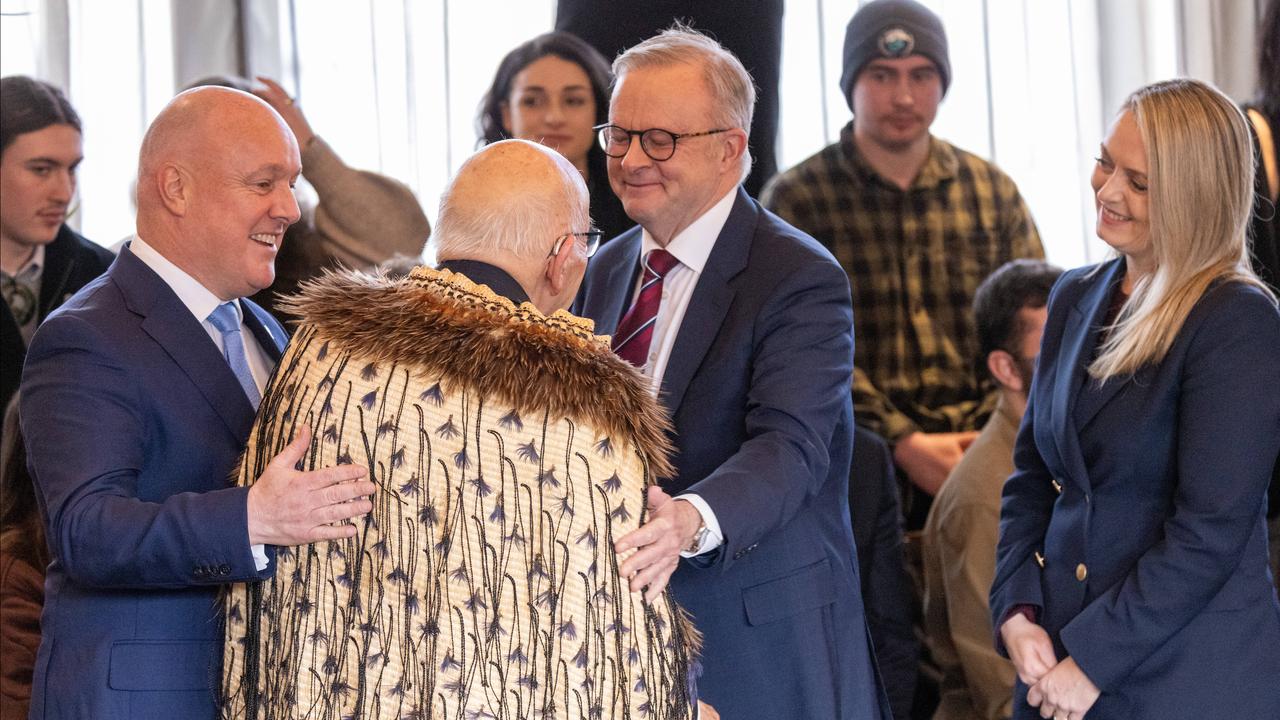
Ahead of official talks including a trade forum and meetings with New Zealand’s leadership, Mr Albanese was welcomed in a powhiri, a formal Maori welcoming ceremony.
Ngai Tahu tribe elders Sir Tipene O’Regan and Edward Ellison, both dressed in feathered cloaks, shook hands with Mr Albanese before the group sat down with business leaders and took part in a business roundtable.
Mr Albanese and Mr Luxon represent opposite ends of the political spectrum, but both have affirmed their nations share a “deep and enduring bond” as friends, neighbours and allies.
“I thank you so much for the warm and generous welcome,” Mr Albanese told attendees.
He spoke of the “uncertain world” the two nations faced with “geopolitical tension, issues with trade and conflict in the world”.
“But there is one thing that is certain and that is that Australia and New Zealand stand together,” Mr Albanese said.
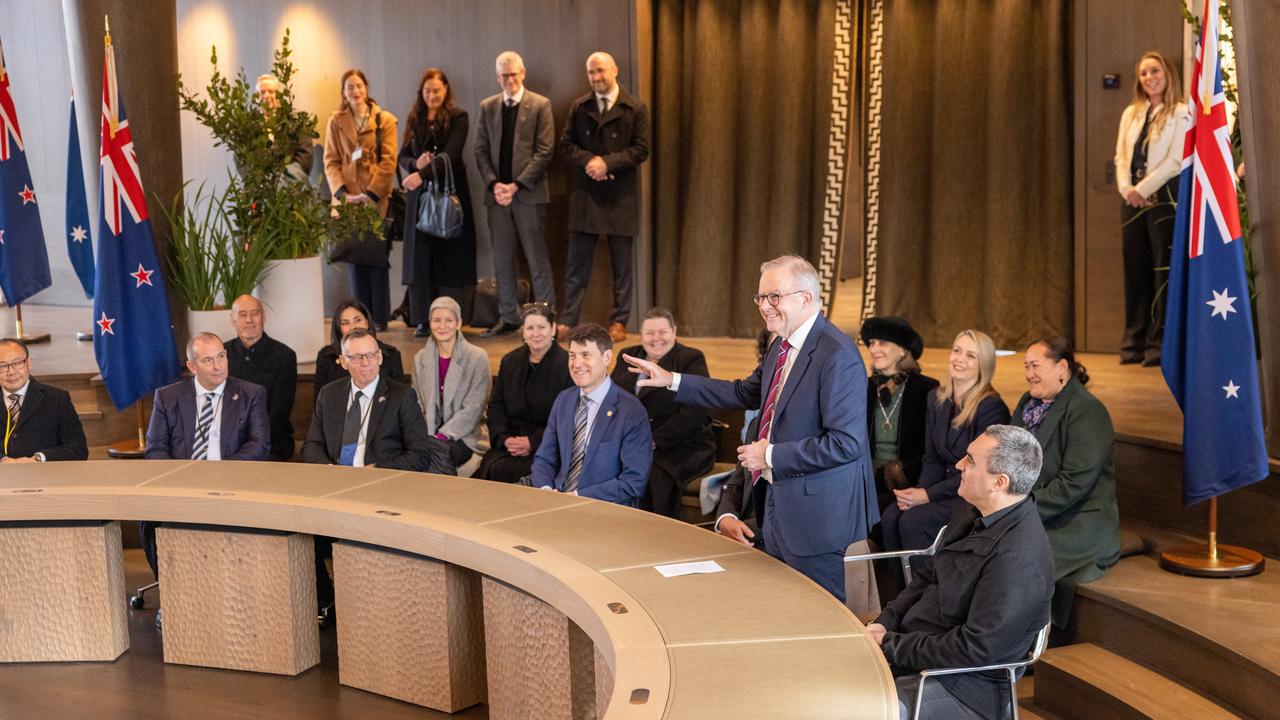
The single economic market was established in 2009 to grow trade and deepen investment links between the two countries, making it easier for trans-Tasman business.
Two-way trade between the two countries is worth $32 billion.
Co-operation between the two governments is broad, with more than half of the NZ cabinet visiting Australia since Mr Luxon’s government took office in late 2023.
The “complicated” relationship between opportunities and challenges posed by China was likely to be a focus of talks behind the scenes, Victoria University of Wellington’s New Zealand Contemporary China Research Centre director Jason Young said.
“Both prime ministers have recently visited China,” he told AAP.
“They had, at least, public-facing, very good visits to stabilise and manage the economic relationship.
But at the same time, there’s a bunch of particularly regional security issues which have an impact on both countries.”
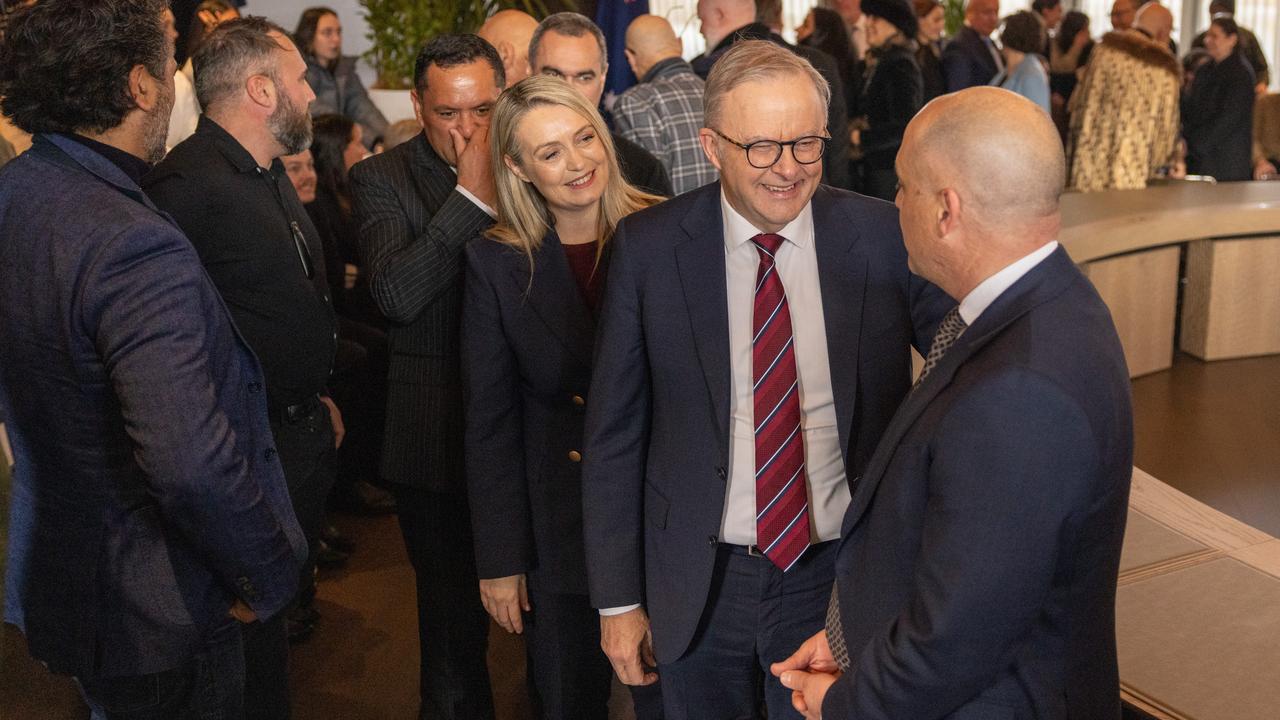
The pair are also set to discuss the impact of the US President Donald Trump’s tariffs.
While Mr Trump raised tariffs against dozens of nations, he showed mercy on Australia and kept levies against most products at 10 per cent.
But NZ was not spared and was hit with a 15 per cent “reciprocal” tariff.
At the most recent leaders’ meeting in Canberra in 2024, Mr Albanese and Mr Luxon discussed migration and creating a closer defence partnership.
David Capie, another professor from Victoria University of Wellington, said the Luxon government had leaned into its partnership with Australia since coming to power.
“You’ve got a New Zealand government that wants to do more with Australia,” the NZ foreign and defence policy expert told AAP.
“The up-ending of the economic order with the Trump tariffs, the Middle East – all of those things NZ and Australia are finding that they’re very closely aligned.”
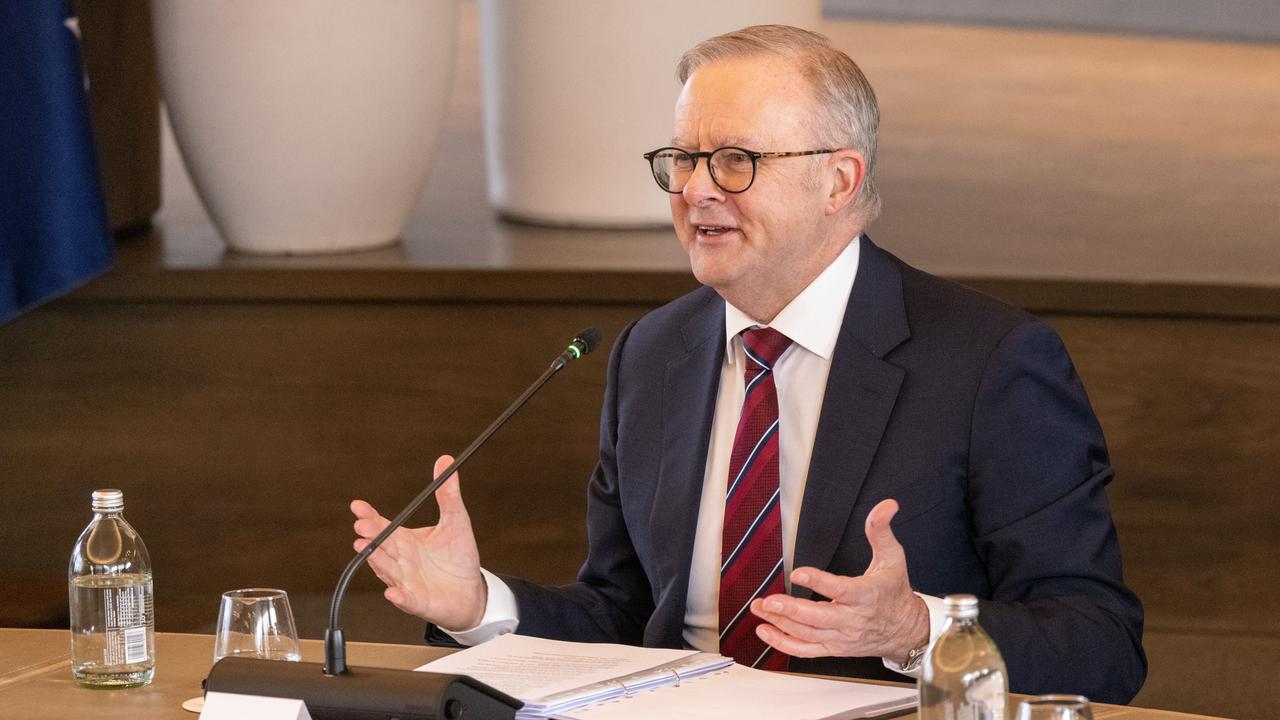
Yet deportation remains a point of friction, as NZ has long protested Australia deporting criminals with Kiwi passports but stronger ties to Australia.
After the 2024 meeting, the two leaders agreed to “engage closely” on the matter.
Prof Capie said the issue hadn’t faded away completely but was being more delicately handled than during the Morrison government era.
“You had a lot of deportations and a government that was basically basking in it,” he said.
“But more importantly, the structural changes to the rights of New Zealanders to be able to find a pathway to citizenship mean that there are going to be fewer and fewer over time.”

‘Catastrophic’: Australia condemns Israel plan for Gaza
Australia has united with four counterparts to condemn Israel’s plan to intensify the war on Gaza and assume full control of the territory.
Foreign Minister Penny Wong warned the looming military operation risked violating international law and putting the lives of hostages and civilians in more danger.
In a statement on Saturday, Senator Wong joined Germany, Italy, New Zealand and the United Kingdom to “strongly reject” Israel’s decision to launch a large-scale military operation in Gaza.
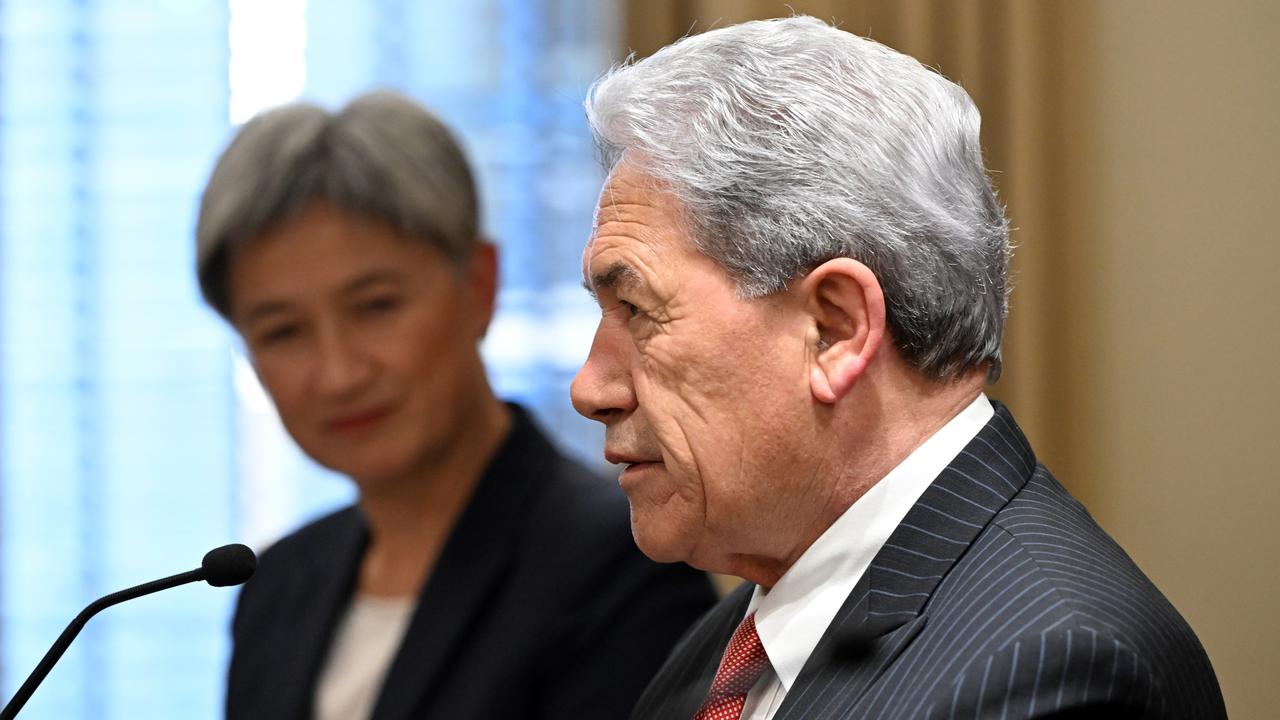
“The plans that the government of Israel has announced risk violating international humanitarian law,” the ministers said.
“Any attempts at annexation or of settlement extension violate international law.”
The foreign ministers said the plans would aggravate the catastrophic humanitarian situation, endanger the lives of the hostages and further risk the mass displacement of civilians.
“We urge the parties and the international community to make all efforts to finally bring this conflict to an end now, through an immediate and permanent ceasefire,” they said.
Israeli Prime Minister Benjamin Netanyahu went against the advice of his military leaders to declare he intended to take military control of all of Gaza.
“We intend to,” Mr Netanyahu told Fox News when asked if Israel would take over the entire territory.

Israel would eventually hand over the territory to Arab forces, which would govern it, he said.
“We don’t want to keep it,” Mr Netanyahu said.
“We want to have a security perimeter. We don’t want to govern it. We don’t want to be there as a governing body.”
The move could displace an estimated one million Palestinians and has sparked international outrage.
Germany has suspended arms sales to Israel, concerned the weapons could be used in Gaza.
German Chancellor Friedrich Merz, a conservative whose support for Israel was a foundation of his election campaign, said he would not authorise any exports of military equipment that could be used in Gaza “until further notice”.
The development marks a major shift in German foreign policy.

The UN Security Council is set to discuss the proposed escalation while Prime Minister Anthony Albanese is expected to discuss the war during a meeting with his New Zealand counterpart, Christopher Luxon, in Queenstown.
The Israeli government is pursuing “total victory” in its war with Hamas, which attacked the nation’s south in October 2023, killing approximately 1200 people and taking about 250 hostages.
Israel’s retaliatory assaults have killed more than 61,000 Palestinians, according to the Gaza health ministry.
Some 200 people, almost half of them children, have reportedly died of starvation.
The worsening humanitarian situation has driven plans from the UK, France and Canada to call for the recognition of Palestine at a UN meeting in September, pending conditions such as Hamas returning the remaining hostages.
Australian government ministers have said the nation’s recognition of Palestinian statehood is a matter of “when, not if”.
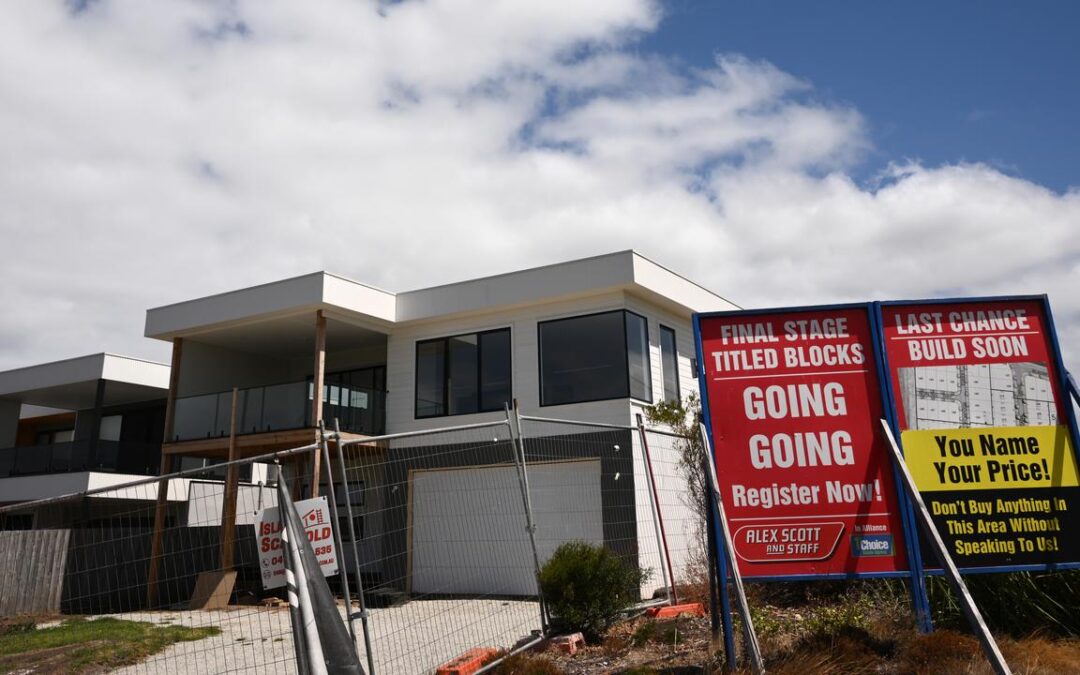
Rates take back seat to affordability for home buyers
Affordability has overtaken interest rates as the greatest obstacle impacting Australians buying and selling homes.
Property tech company InfoTrack has found the cash rate, currently sitting at 3.85 per cent, did not weigh in as a major influence on more than 130,000 Australians’ decision to buy or sell in 2025.
About 45 per cent of those surveyed said it was not a consideration at all, while fewer than a third said interest rates had a significant impact on their decision.
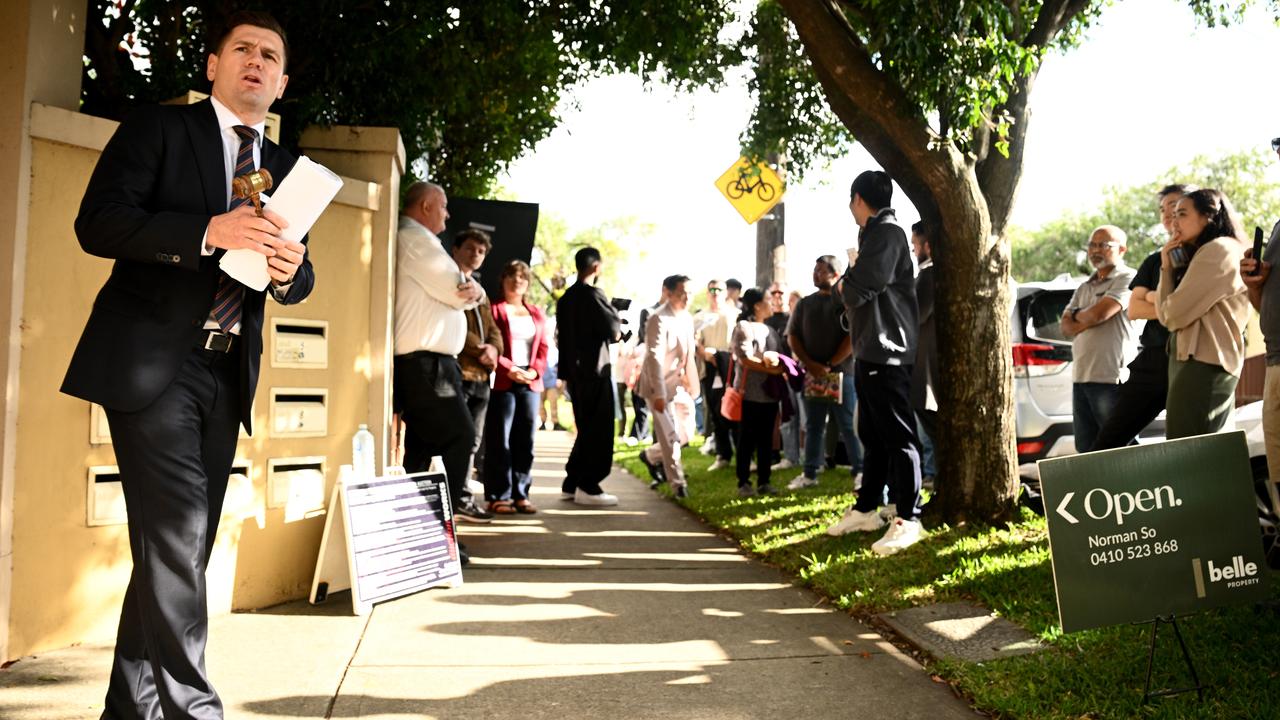
Those who still weighed their decision based on interest rates said they influenced their budget and the type of property they could afford.
About five per cent held off buying or delayed a sale based on the cash rate.
The new figures mark a stark difference from 2024, when interest rates were a major influence for more than two-thirds of those surveyed.
“The finding challenges the idea that interest rates are stopping people from buying or selling,” InfoTrack’s head of property Australia Lee Bailie said.
“Instead, Australians are shifting their approach – they’re staying active in the market but they’re adapting to current conditions.”
Interest rates appear less of an obstacle for buying or selling a property this year, with affordability the reigning hurdle.
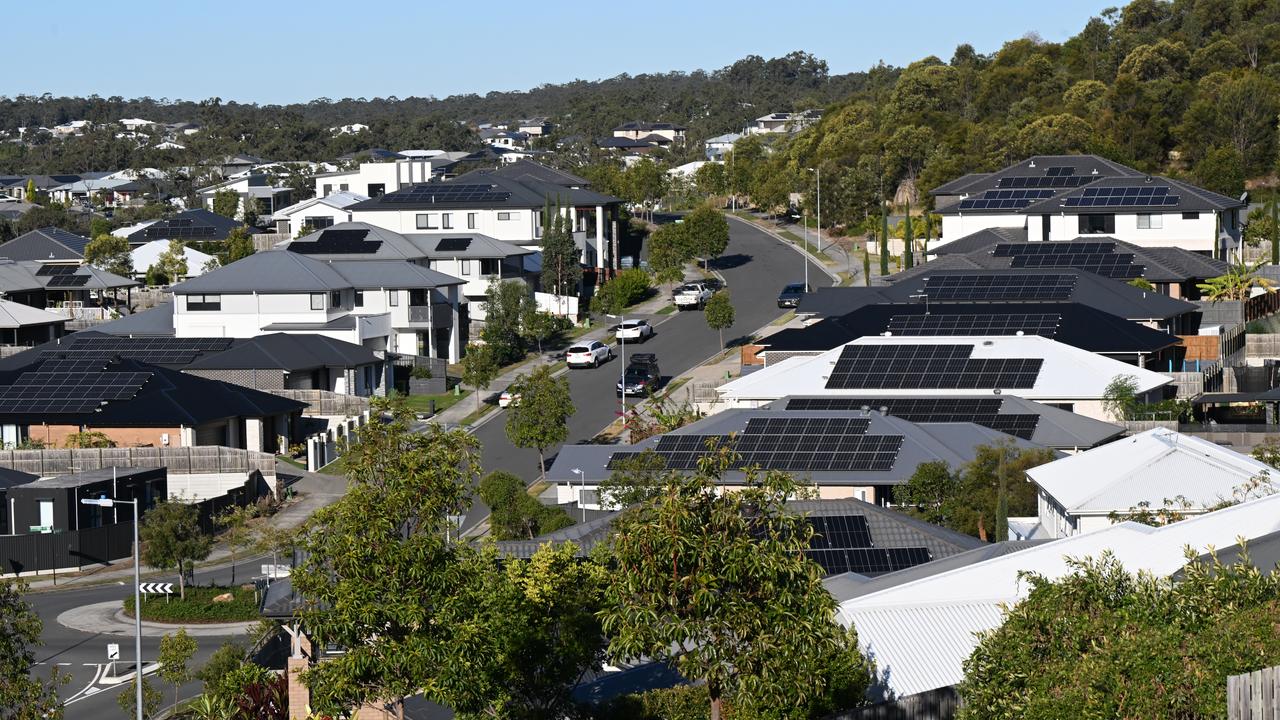
Almost a third of those surveyed said property prices were the biggest challenge in the housing market – a six per cent increase from 2024.
“The data is further evidence of the affordability crisis,” Mr Bailie said.
“More than half admitted property prices had a significant or major impact on their decision to buy or sell, while more than two-thirds of respondents said price determined where they bought.”
Some buyers and sellers were also influenced by market conditions, InfoTrack found, with 17 per cent struggling to find a property and more than half feeling pushed to act quickly due to price volatility amid pressure from competition.
Home prices across the nation continue to climb, with recent data from PropTrack revealing a 0.4 per cent rise in June and an overall 4.6 per cent jump across the year.
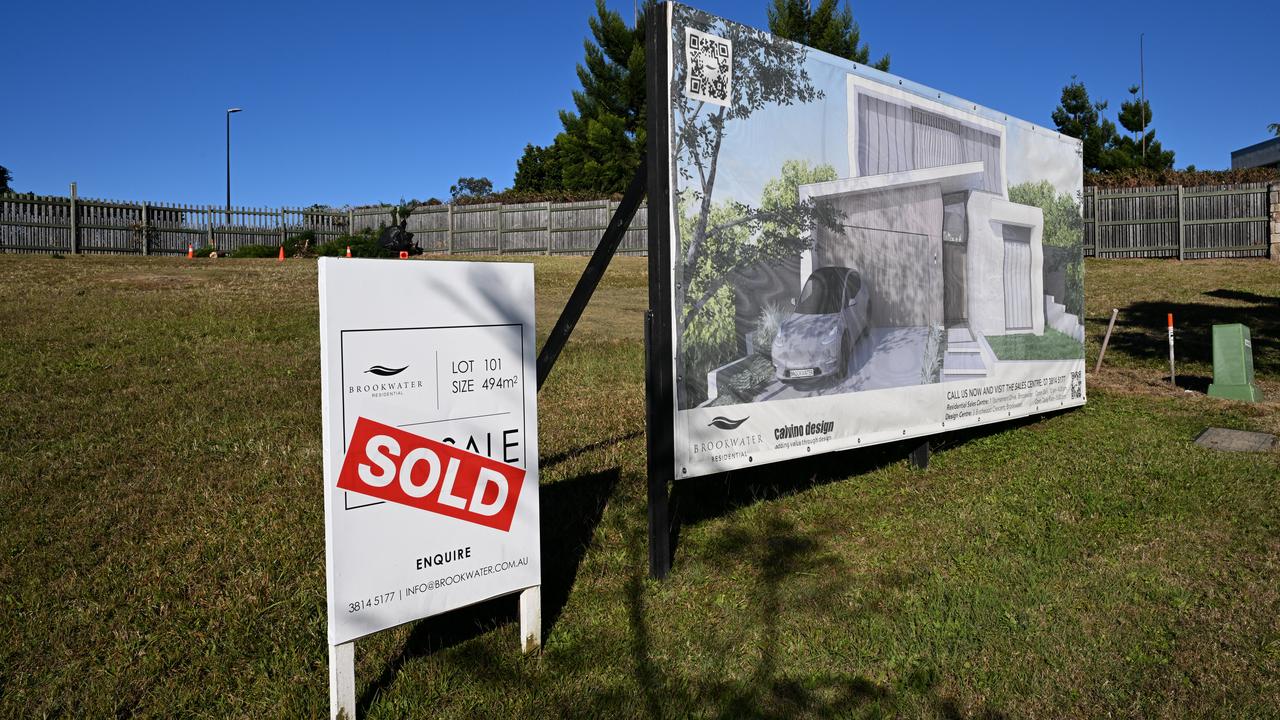
This pushed the median cost of a capital city home to $923,000, with the average property now $40,000 more expensive than earlier this year.
Adelaide, up 0.6 per cent, posted the strongest monthly rise, followed by Sydney and Hobart, which both recorded 0.5 per cent gains.
Perth, Melbourne, Brisbane and Canberra prices rose 0.3 per cent, while Darwin nudged 0.2 per cent higher.
While rates may no longer be a primary factor for people buying or selling homes, they still attract intense interest every six weeks when the Reserve Bank of Australia hands down its cash rate decisions.
Many economists have tipped next week’s decision to include cash rate relief by dropping to 3.6 per cent, which would shave about $90 off monthly repayments on a $600,000 mortgage.
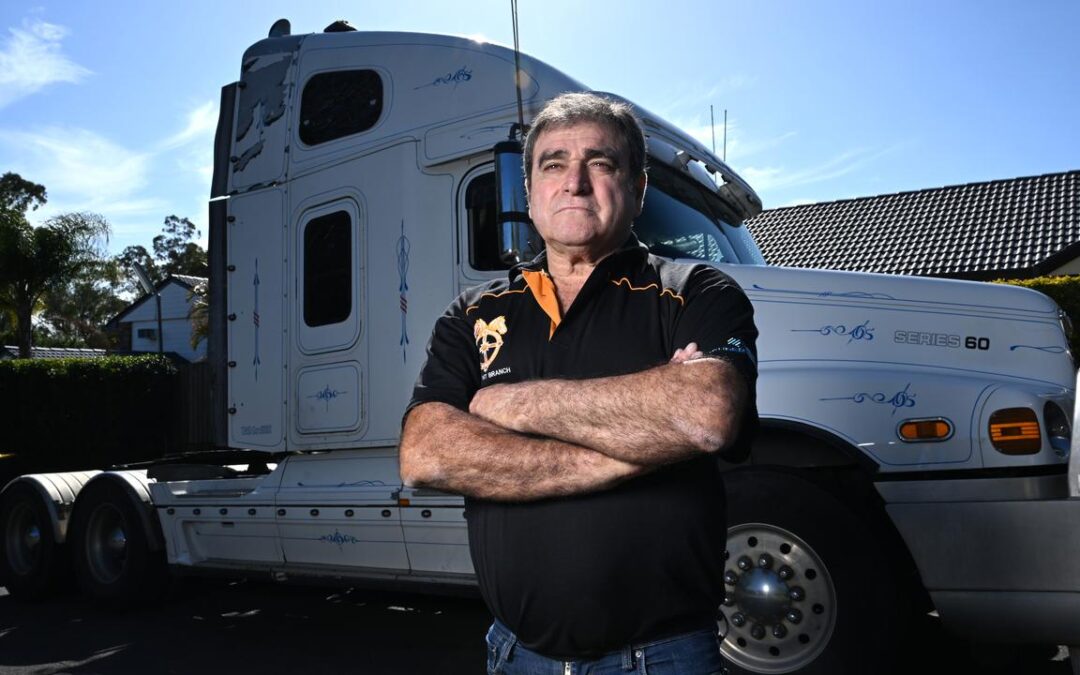
‘More gruelling, precarious’: climate biting workforce
Closed roads and long detours have become increasingly common for veteran truckie Frank Black.
As an owner-driver, one of the downsides of his flexible work is that he generally picks up the tab for any unexpected costs.
He was once forced to fork out an extra $700 in fuel to go the long way after heavy rain and flooding cut off his direct route.
“You’ve got to start weighing up, do you spend the extra money, or do you sit on the side of the road for three or four days?” he tells AAP.
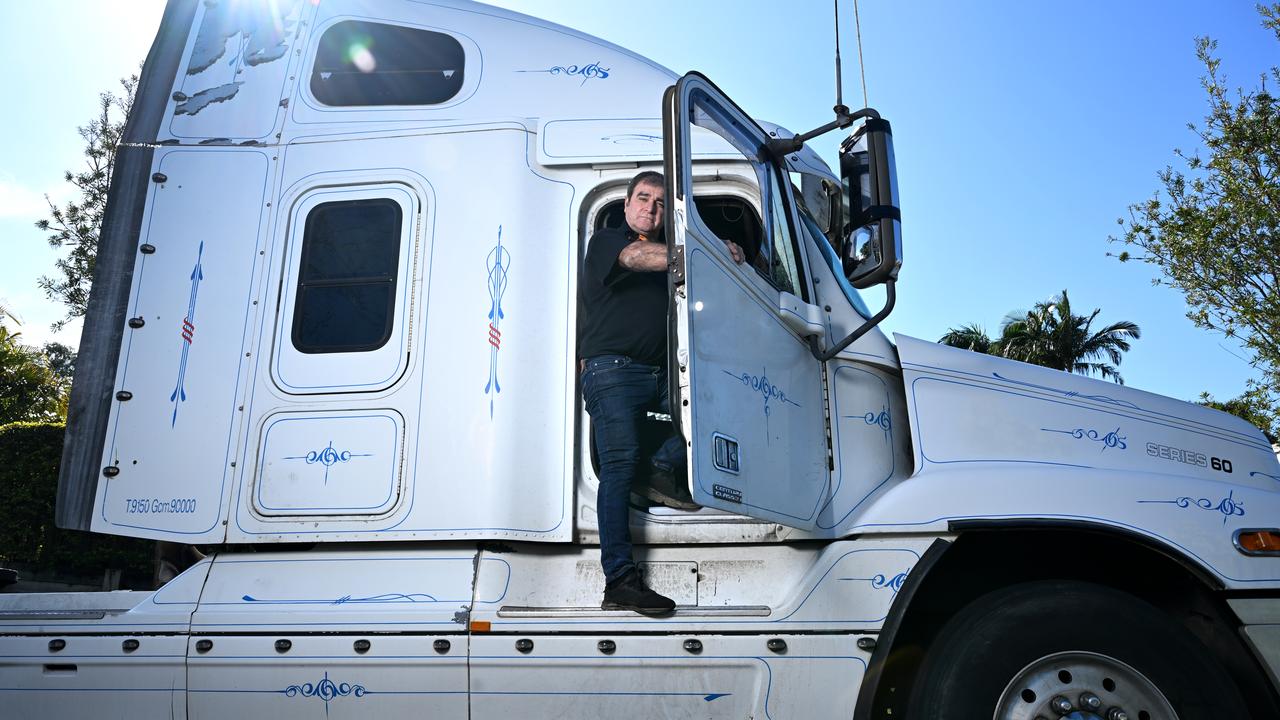
Weather-related disruptions have occurred throughout his 40-year career criss-crossing the countryside, but lately, road closures have become more frequent.
Australia has always experienced climate extremes but scientists warn human-caused global warming is ramping up the intensity and frequency of such events.
In a calendar year already marred by floods, bushfires, cyclones, heatwaves and a toxic algal bloom devastating South Australia’s marine wildlife and local fishing operations, climate change is leaving its mark on economic activity nationwide.
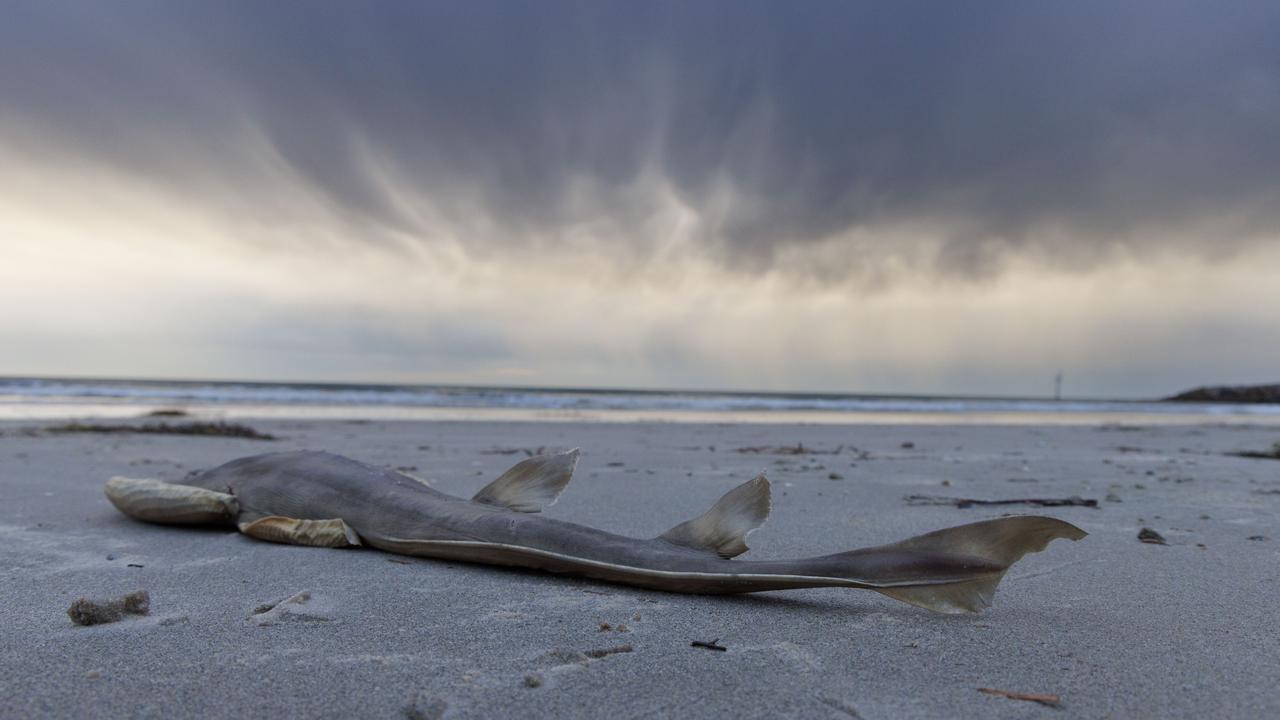
The Productivity Commission views climate-related risks as a drag on the nation’s prosperity even with future emissions reductions.
This week, the independent national think tank urged Australia to invest in adaptation and resilience to minimise the ballooning costs of disaster recovery in its second of five planned reports aimed at boosting lacklustre productivity.
Lauren Rickards, director of the La Trobe Climate Change Adaptation Lab, says few professions or industries are spared disruptions from a warming planet.
There are jobs lost, gained and altered by an economy cutting ties with greenhouse gas emissions, with the fossil fuel sector already in decline and renewables and other clean industries on the rise.
There are also a number of roles exposed to the physical risks of a changing climate, such as jobs linked to a tourism site that’s forced to temporarily close after a bushfire.
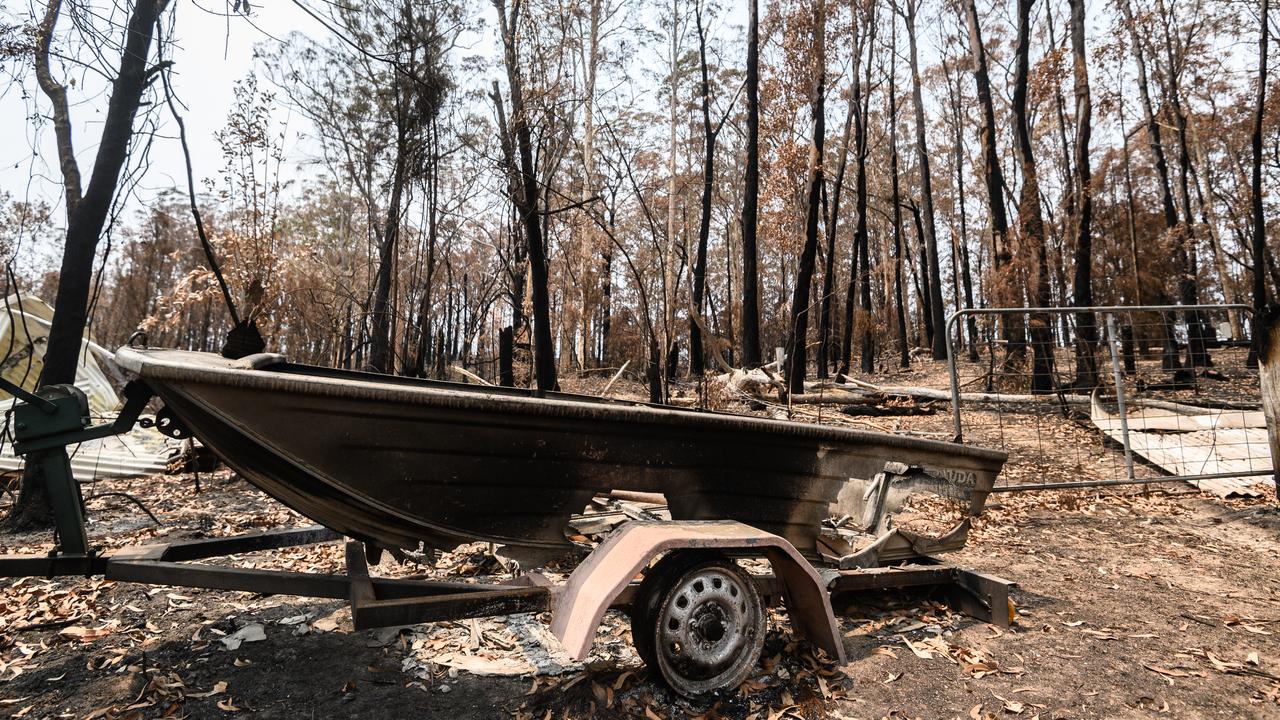
For tradies and other outdoor workers, safety is a major concern on extremely hot and humid days.
“But that’s just really the tip of the iceberg when it comes to the impacts on work,” Professor Rickards tells AAP.
Her research suggests climate change is impacting workers in a host of other incremental and interconnected ways.
“It’s more about, you know, a thousand cuts,” she says.
Climate-driven weather extremes are already chewing into organisational budgets, especially in government.
Councils forced to continually repair road infrastructure means there’s less money to employ workers for waste management and other services falling under the remit of local government.
Strained budgets and squeezed resources spill over into lives outside of work, Prof Rickards explained, such as spending less time with family or choosing to forgo volunteering due to extra overtime and bigger workloads.
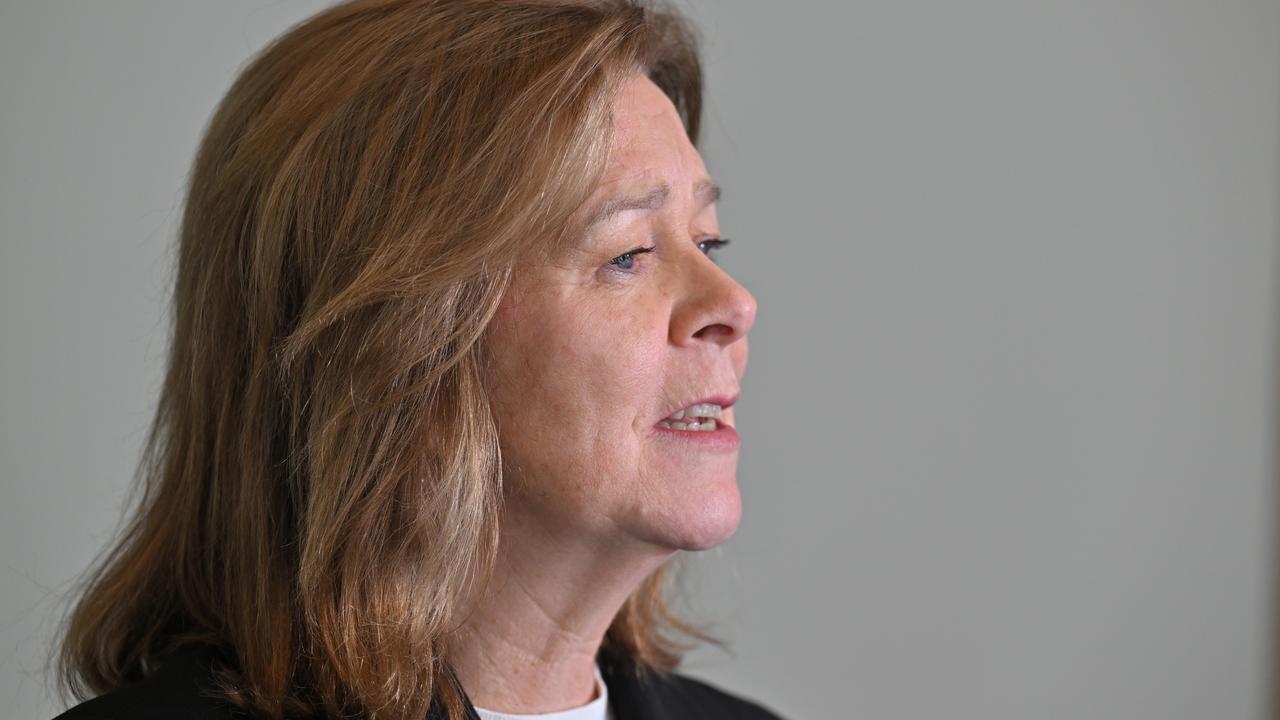
Australian Council of Trade Unions president Michele O’Neil agrees no worker or sector is immune from climate impacts, from firefighters battling more severe blazes to teachers managing children in hot classrooms.
“It’s making the vast bulk of jobs more gruelling and more precarious and more dangerous,” she tells AAP.
Unions want more done to prevent climate-related illness and injury before it occurs.
This boils down to Australia doing its fair share of emissions reductions as well as investing in adaptation and resilience, including ensuring emergency services are well-resourced and trained appropriately.
“There’s a potential for good jobs to be created,” Ms O’Neil says.
“We need to make sure that we don’t unfairly rely on volunteers in a crisis.”
She describes a “dual impact” on workers during climate diasters.
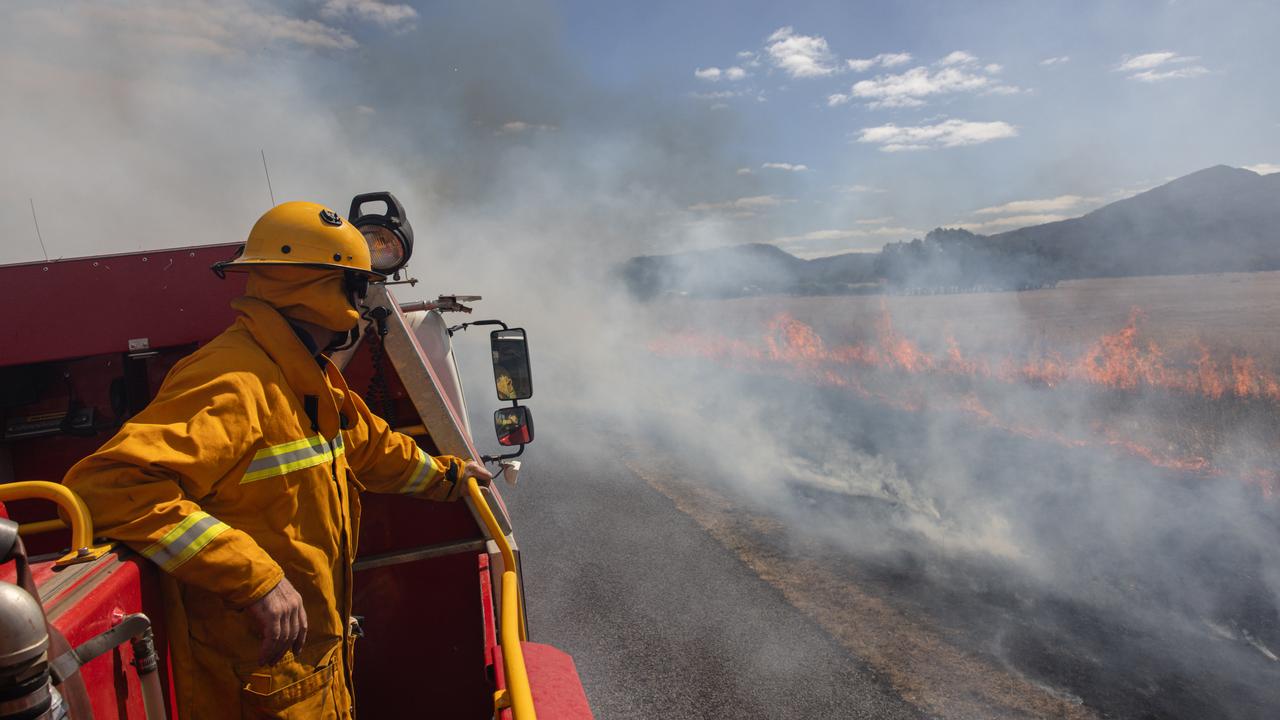
Workers can be left in the lurch if their place of work becomes inaccessible or unsafe and these same employees tend to be the volunteers putting up their hands to deal with emergency response.
“So one of the things that unions have been negotiating for a long time is for people involved in emergency and disaster responses to not lose pay when they volunteer,” Ms O’Neil says.
A number of industries and workplaces also now allow access to paid leave when workers are unable to work due to weather extremes and disasters, but coverage is not uniform.

The Transport Workers Union, which represents workers like Mr Black, believes clients should cover the cost of detours caused by climate extremes.
Mr Black says they sometimes chip in but it is not the norm.
“These weather events are going to keep happening, and it’s up to the tops of our supply chains to pay their fair share so drivers can viably and safely respond to crises,” TWU national secretary Michael Kaine says.

Mexico accuses Adidas of cultural appropriation
Mexican authorities are accusing sportswear company Adidas of plagiarising artisans in southern Mexico, alleging that a new sandal design is strikingly similar to the traditional indigenous footwear known as huaraches.
The controversy has fuelled accusations of cultural appropriation by the footwear brand, with authorities saying this is not the first time traditional Mexican handicrafts have been copied.
Local authorities have asked Adidas to withdraw the shoe model.
Mexican President Claudia Sheinbaum said on Friday that Adidas was already in talks with authorities in the southern Mexican state of Oaxaca to provide “compensation for the people who were plagiarised.”
Her government is preparing legal reforms to prevent the copying of Mexican handicrafts.
Adidas did not immediately respond to a request for comment from The Associated Press.
The design at the centre of the controversy is the Oaxaca Slip-On, a sandal created by designer Willy Chavarría for Adidas Originals.
The sandals feature thin leather straps braided in a style that is unmistakably similar to the traditional Mexican huaraches.
Instead of flat leather soles, the Adidas shoes tout a more chunky sole.
According to Mexican authorities, Adidas’ design contains elements that are part of the cultural heritage of the Zapotec indigenous communities in Oaxaca, particularly in the town of Villa Hidalgo de Yalálag.
Handicrafts are a crucial economic lifeline in Mexico, providing jobs for around half a million people across the country.
The industry accounts for around 10 per cent of the gross domestic product of states like Oaxaca, Jalisco, Michoacán and Guerrero.
Authorities in Oaxaca have called for the Oaxaca Slip-On to be withdrawn and demanded a public apology from Adidas, with officials describing the design as “cultural appropriation” that may violate Mexican law.
In a public letter to Adidas leadership, Oaxaca state governor Salomón Jara Cruz criticised the company’s design, saying that “creative inspiration” is not a valid justification for using cultural expressions that “provide identity to communities”.
“Culture isn’t sold, it’s respected,” he added.
The controversy follows years of efforts by Mexico’s government and artisans to push back on major global clothing brands who they say copy traditional designs.
In 2021, the federal government asked manufacturers, including Zara, Anthropologie and Patowl, to provide a public explanation for why they copied clothing designs from Oaxaca’s indigenous communities to sell in their stores.
Now, Mexican authorities say they’re trying to work out stricter regulations to protect artists.
But Marina Núñez, Mexico’s undersecretary of cultural development, noted that they also want to establish guidelines to not deprive artists of “the opportunity to trade or collaborate with several of these companies that have very broad commercial reach”.